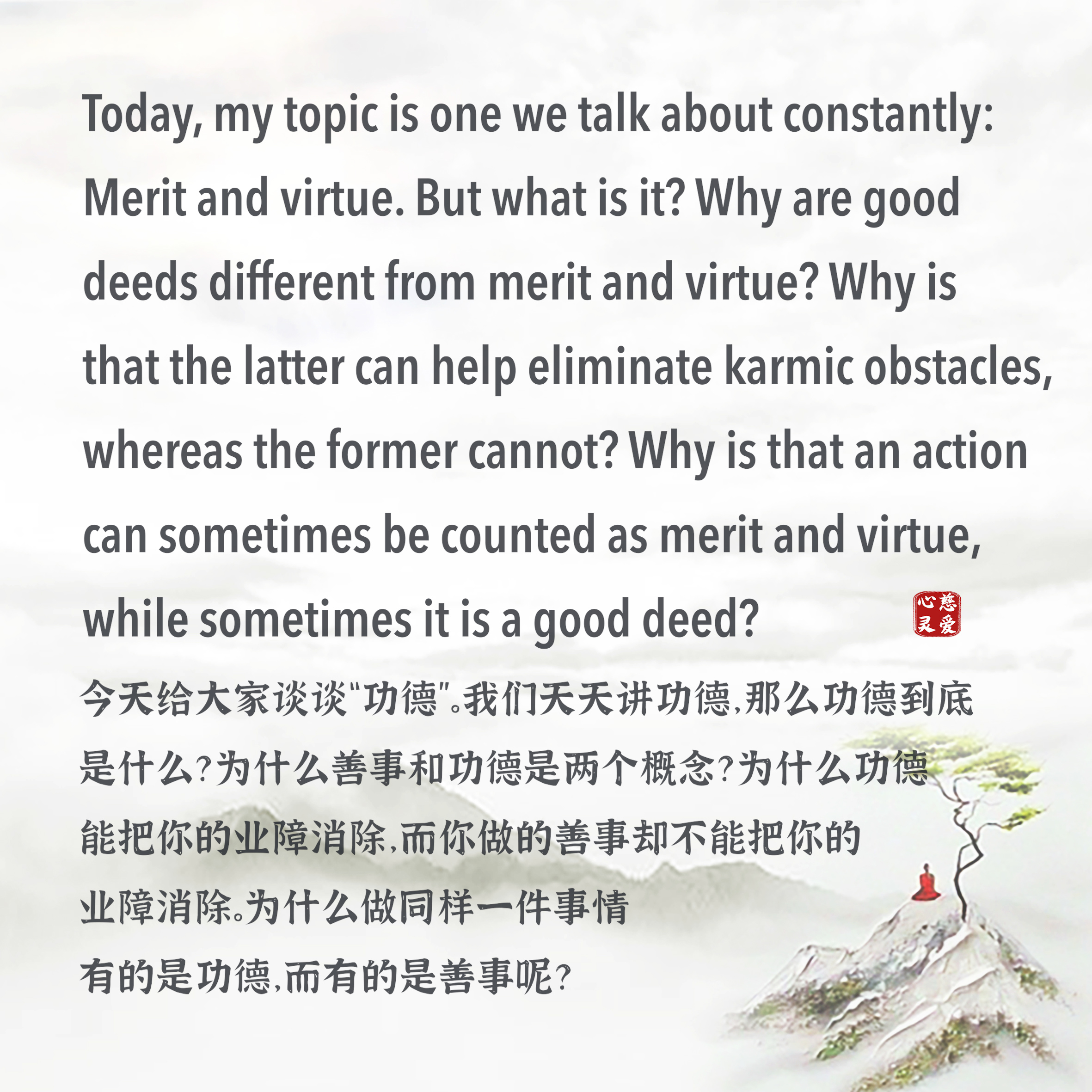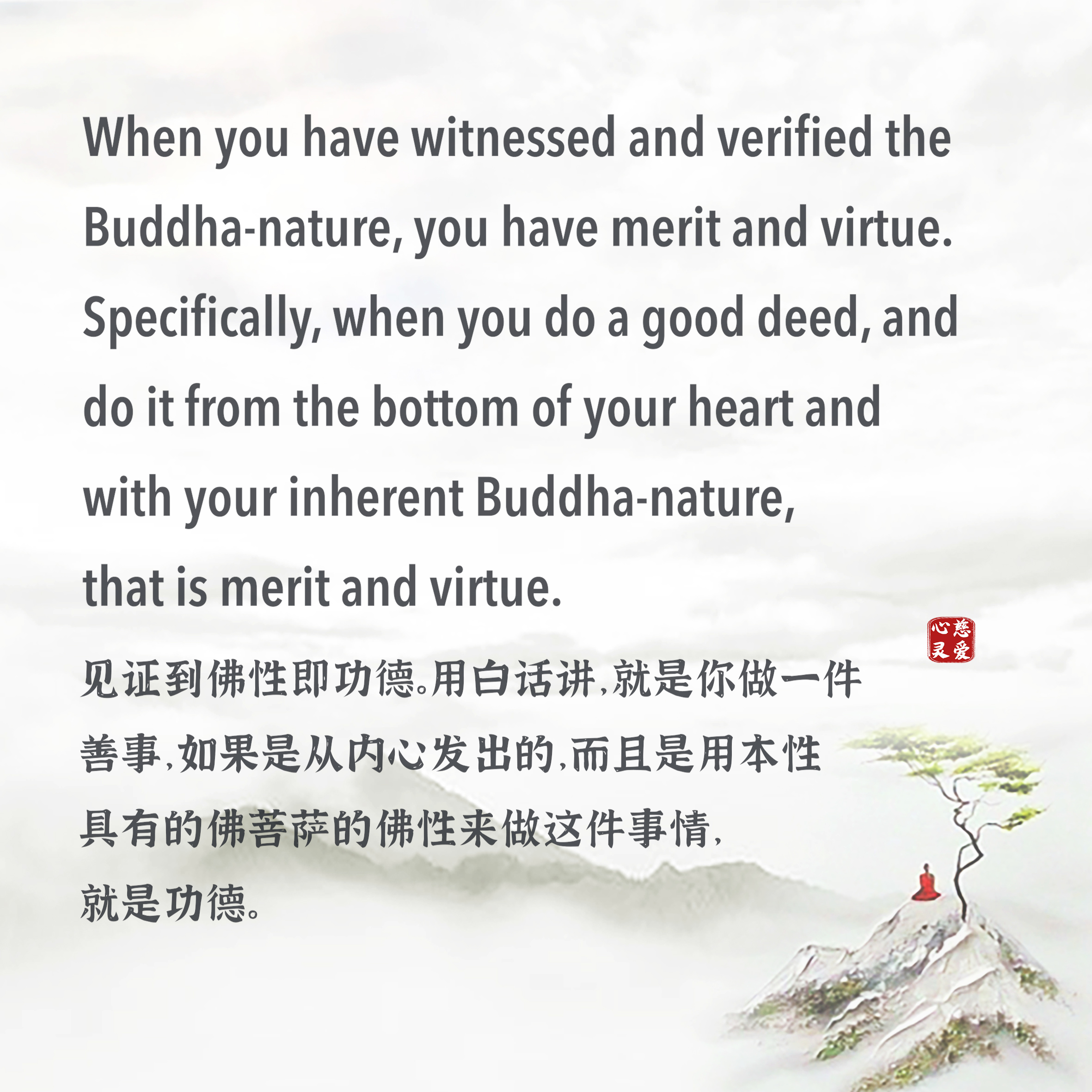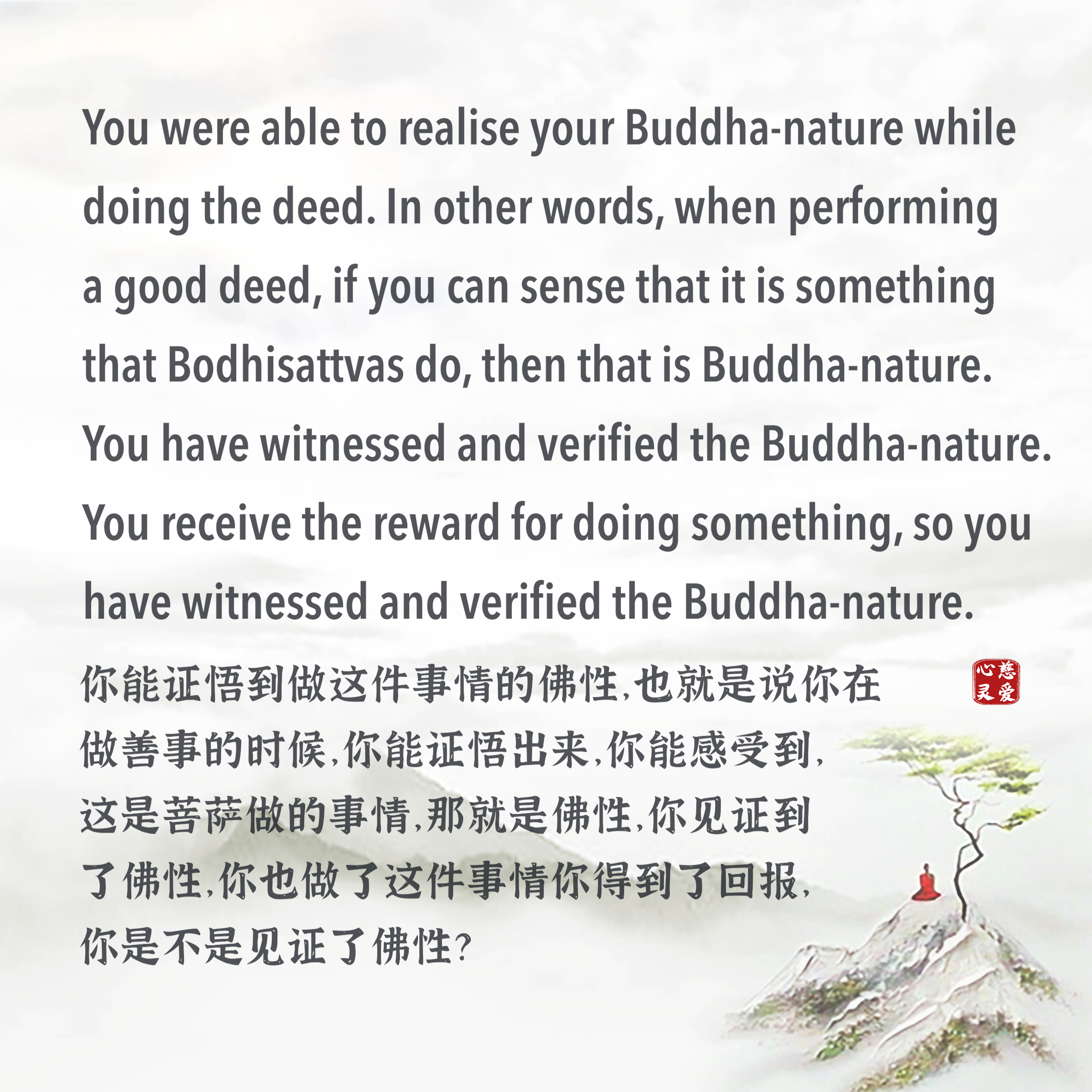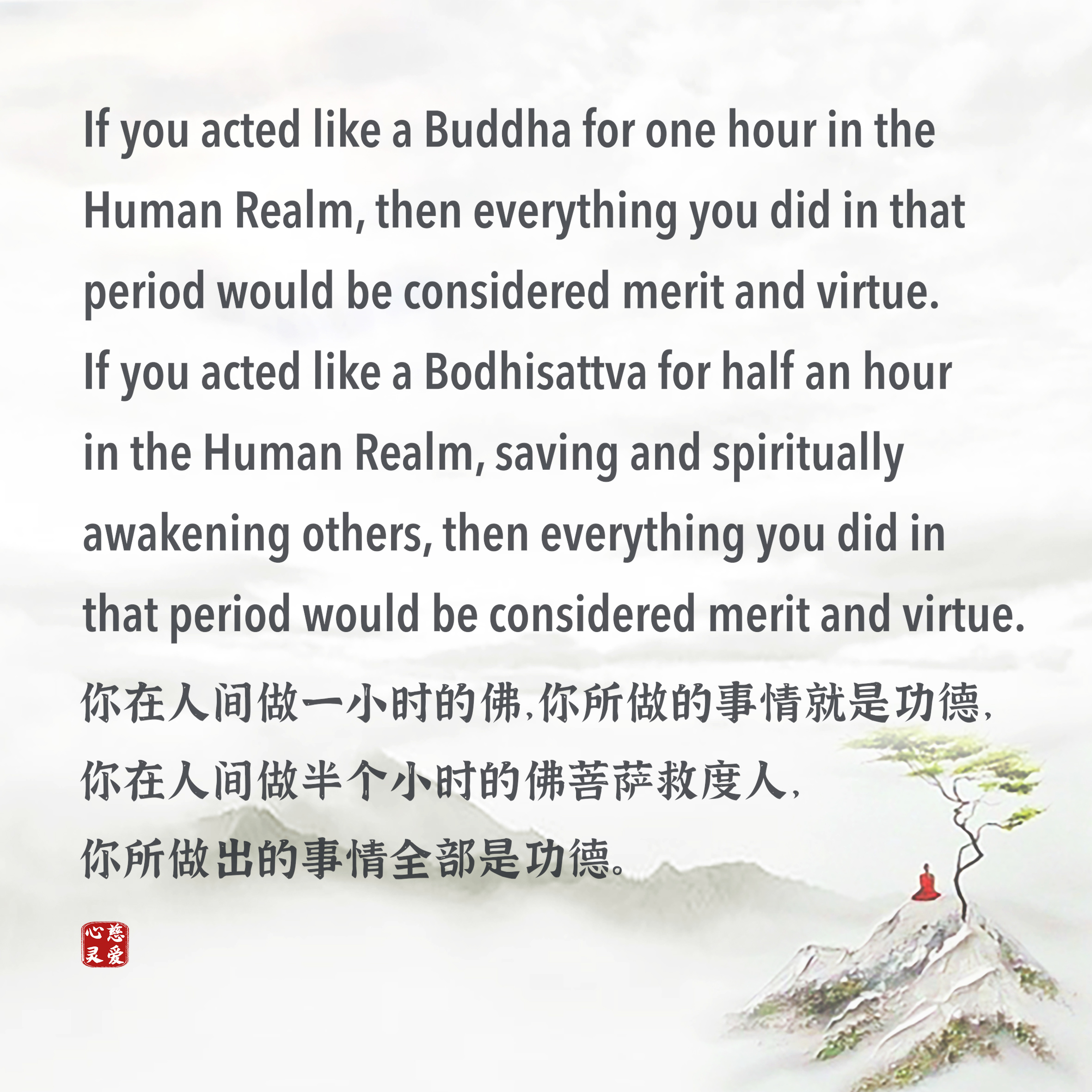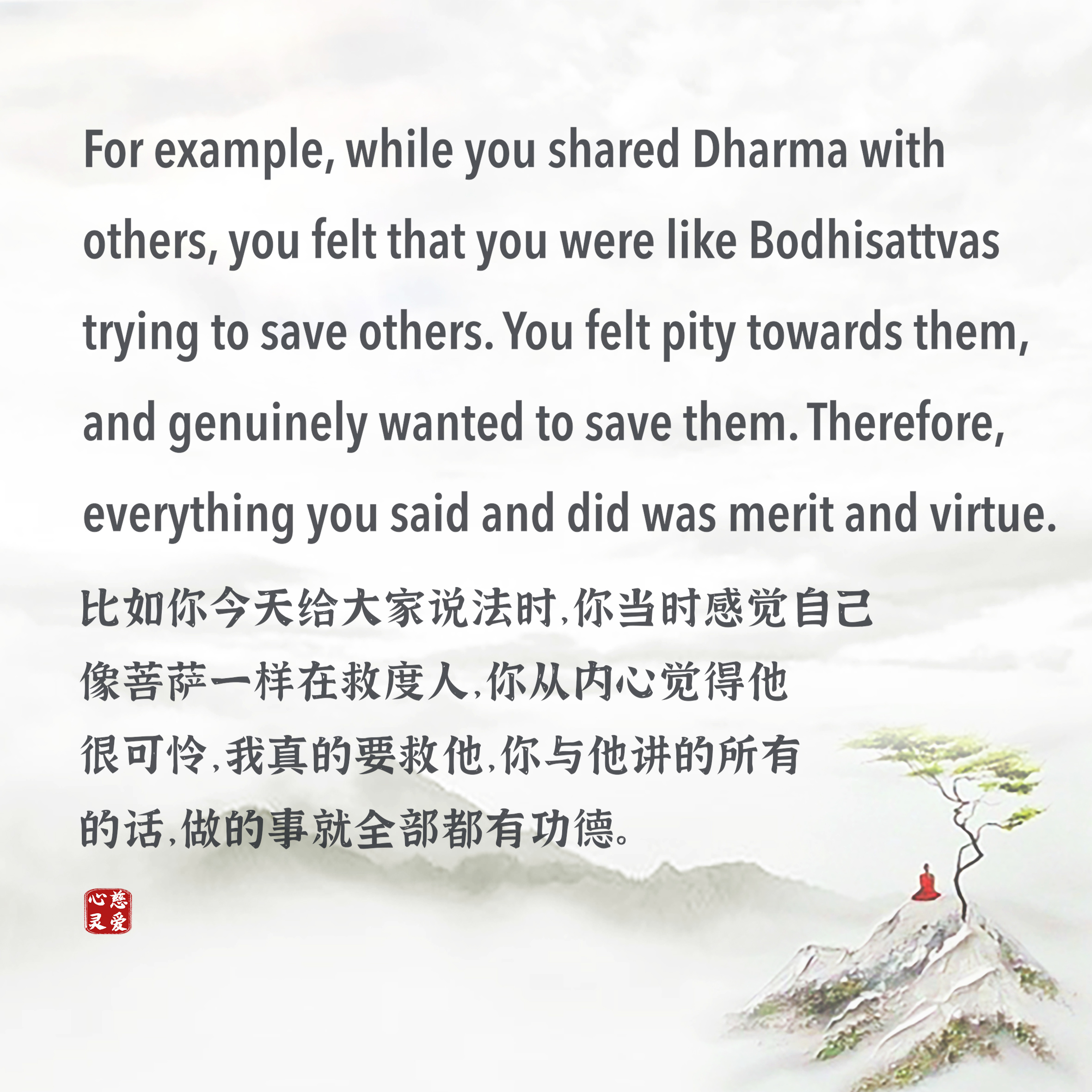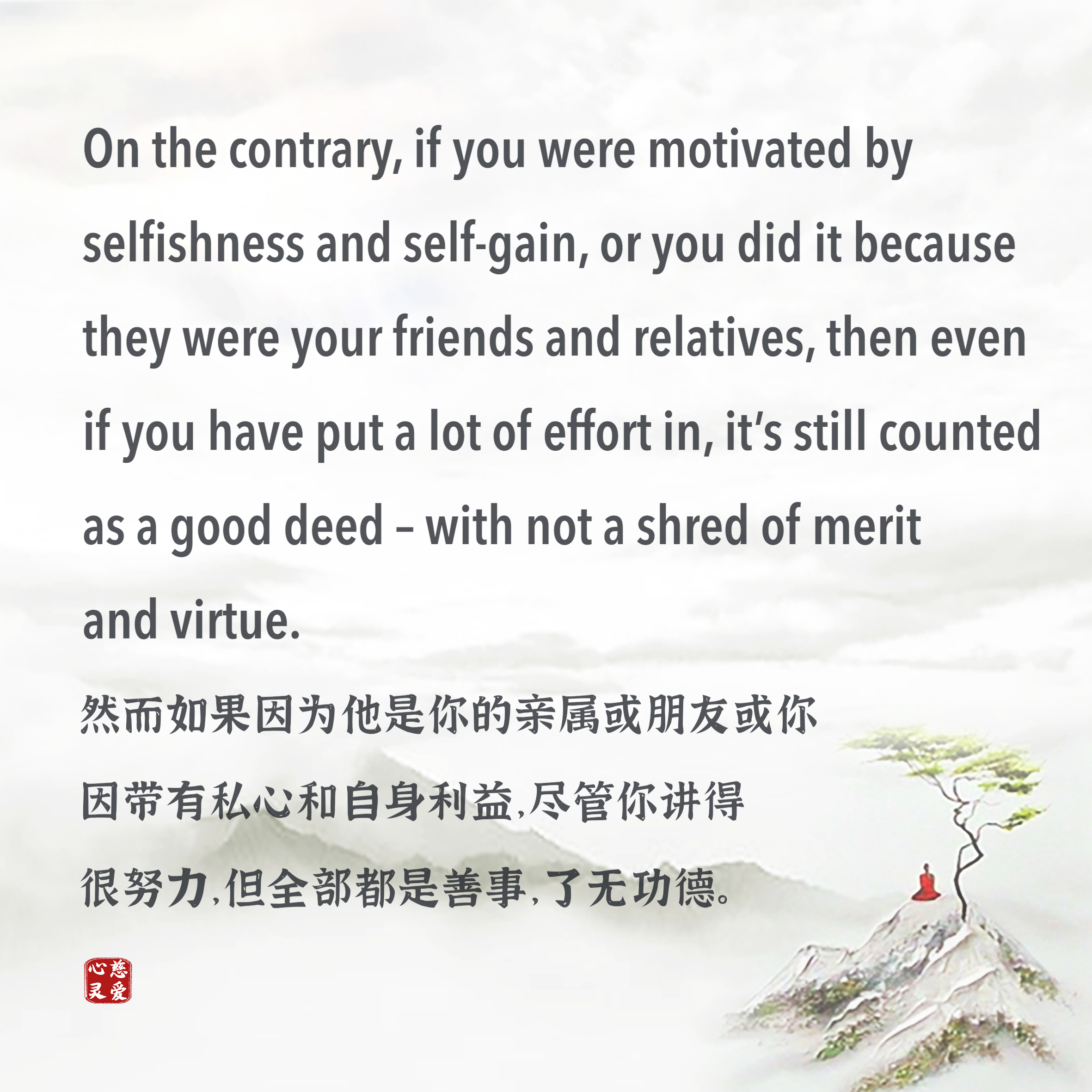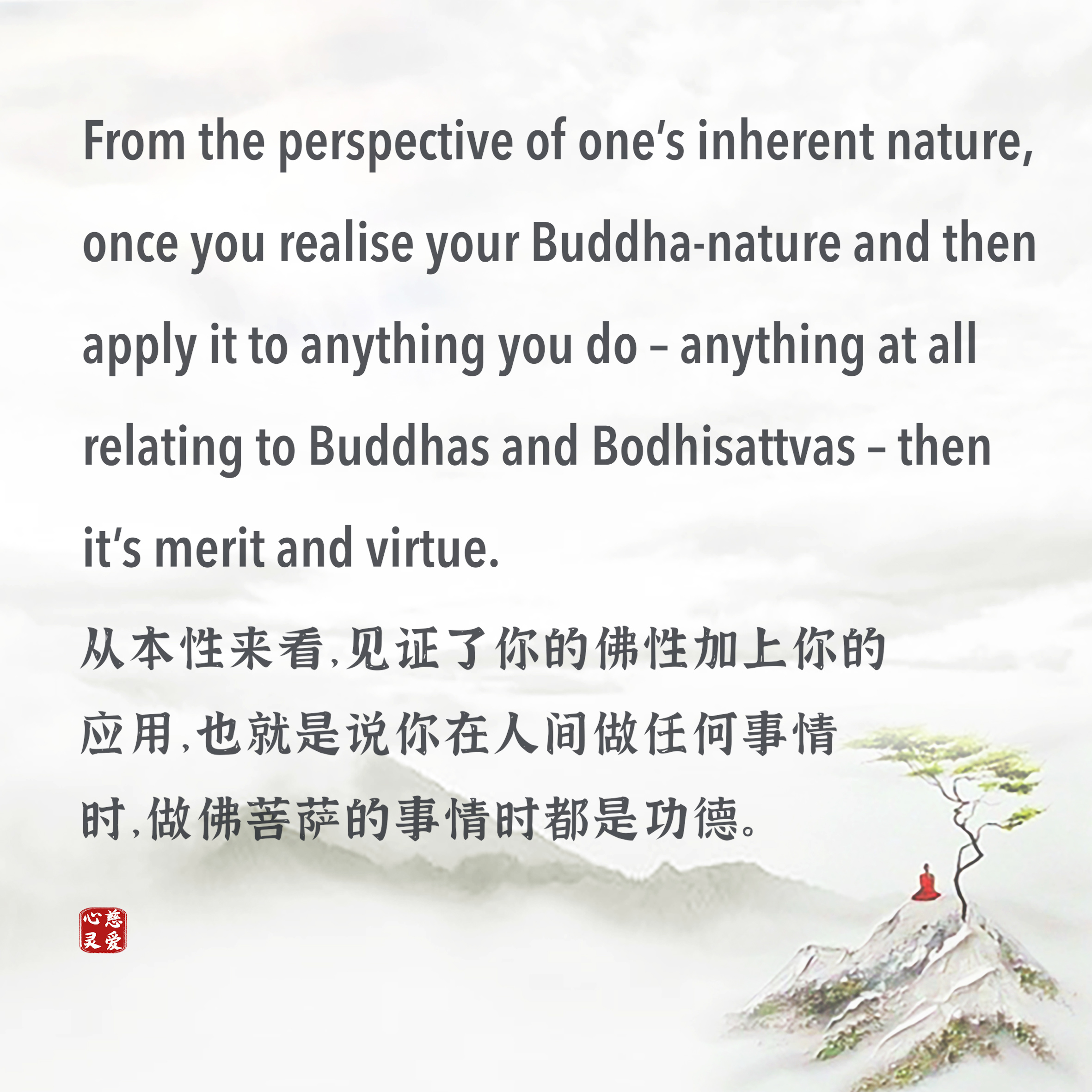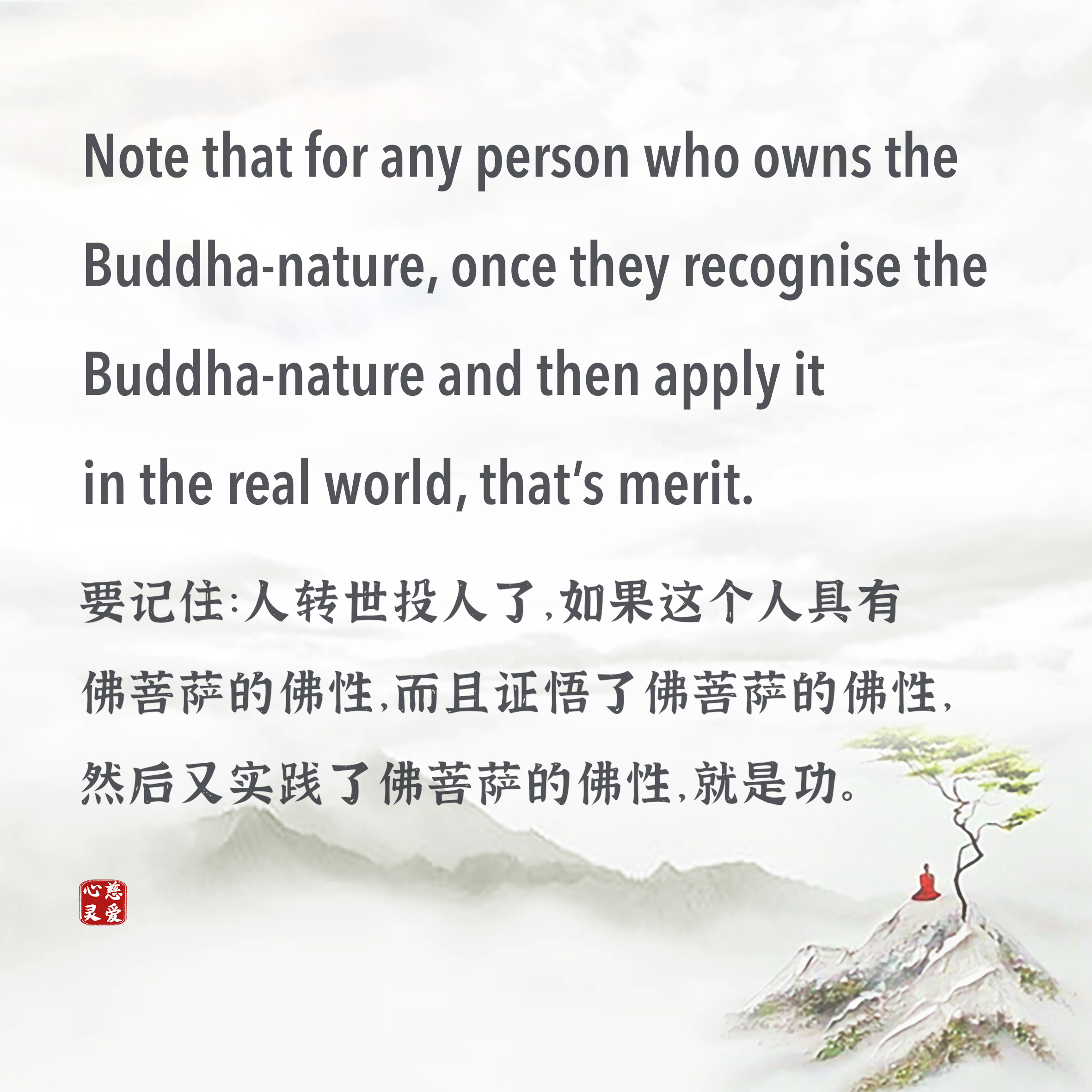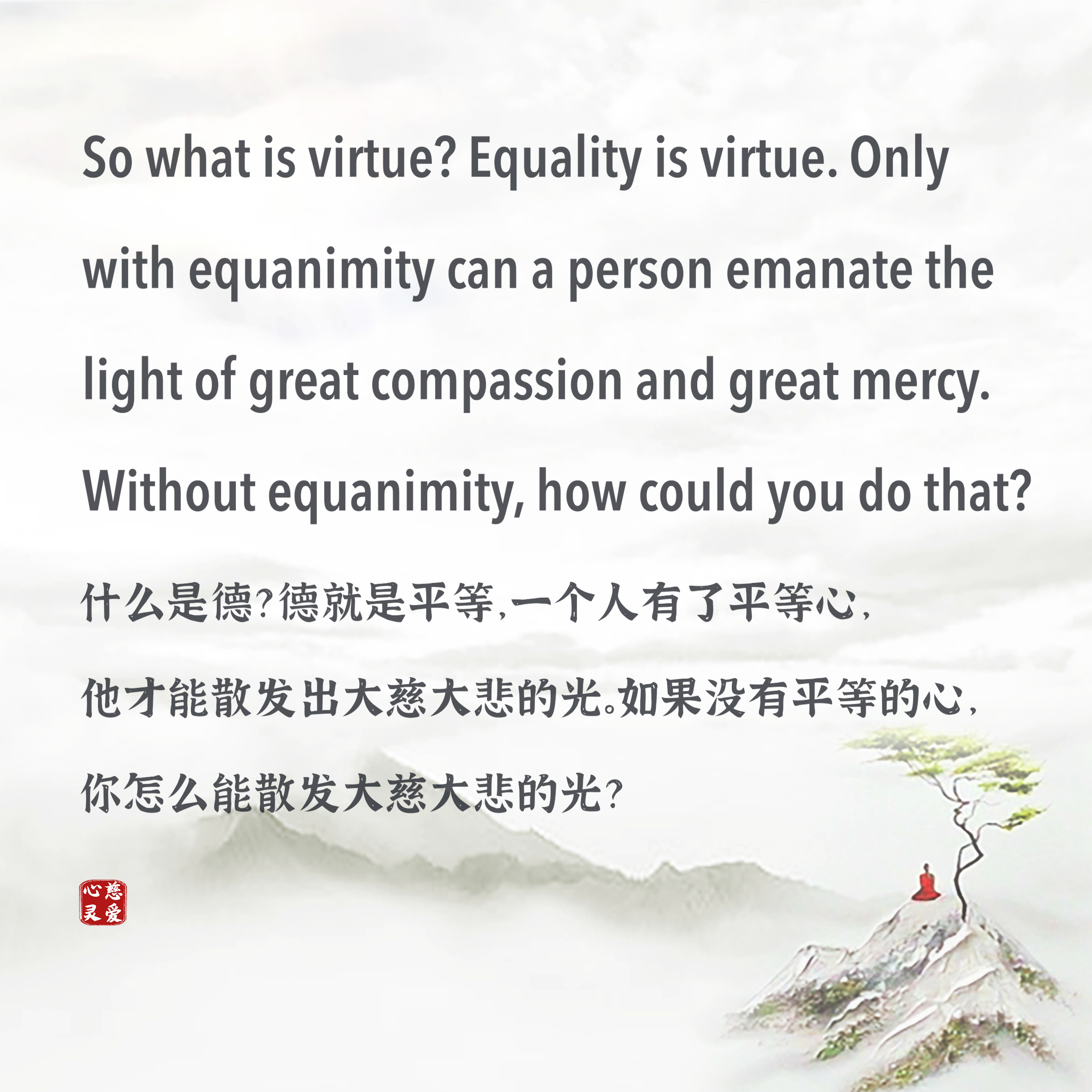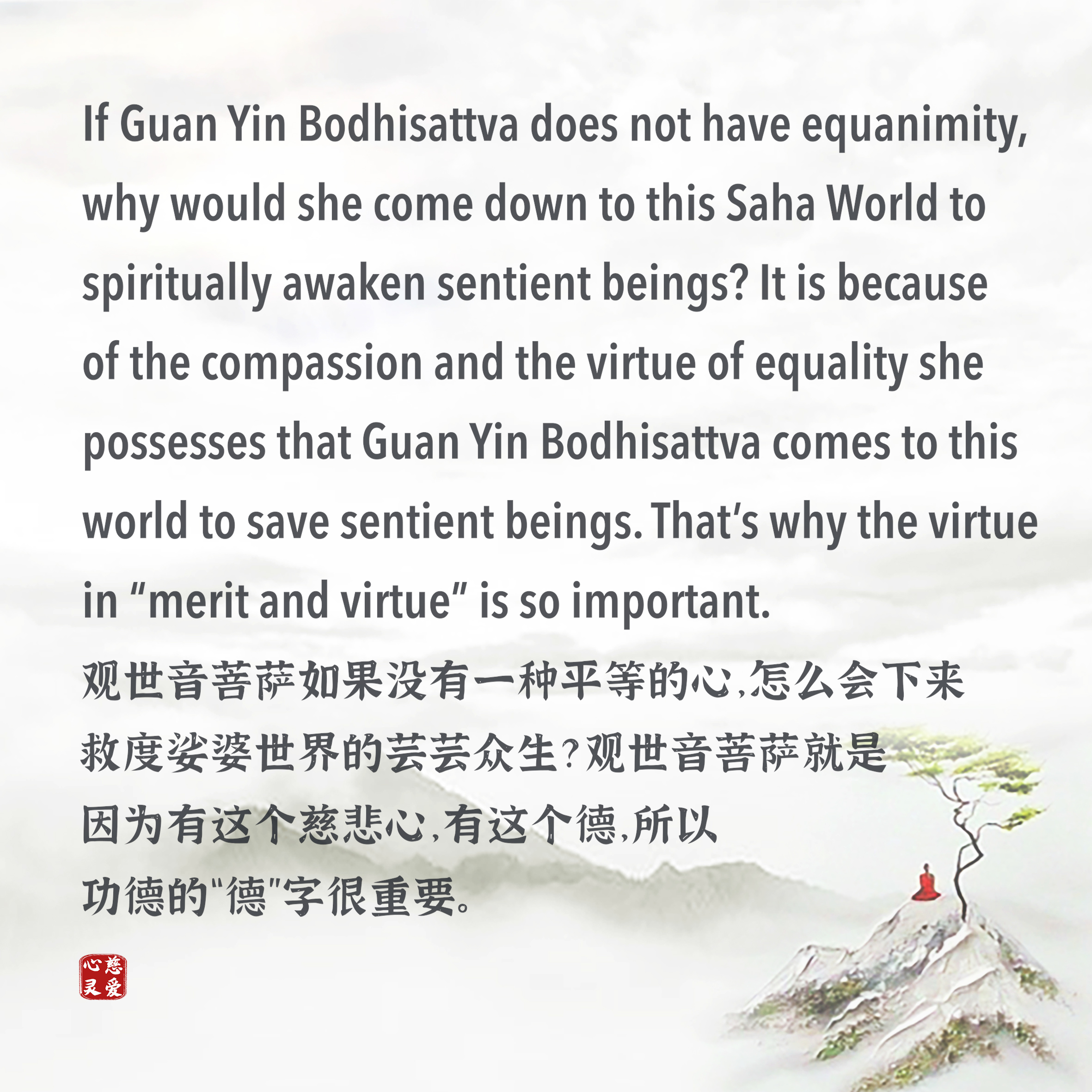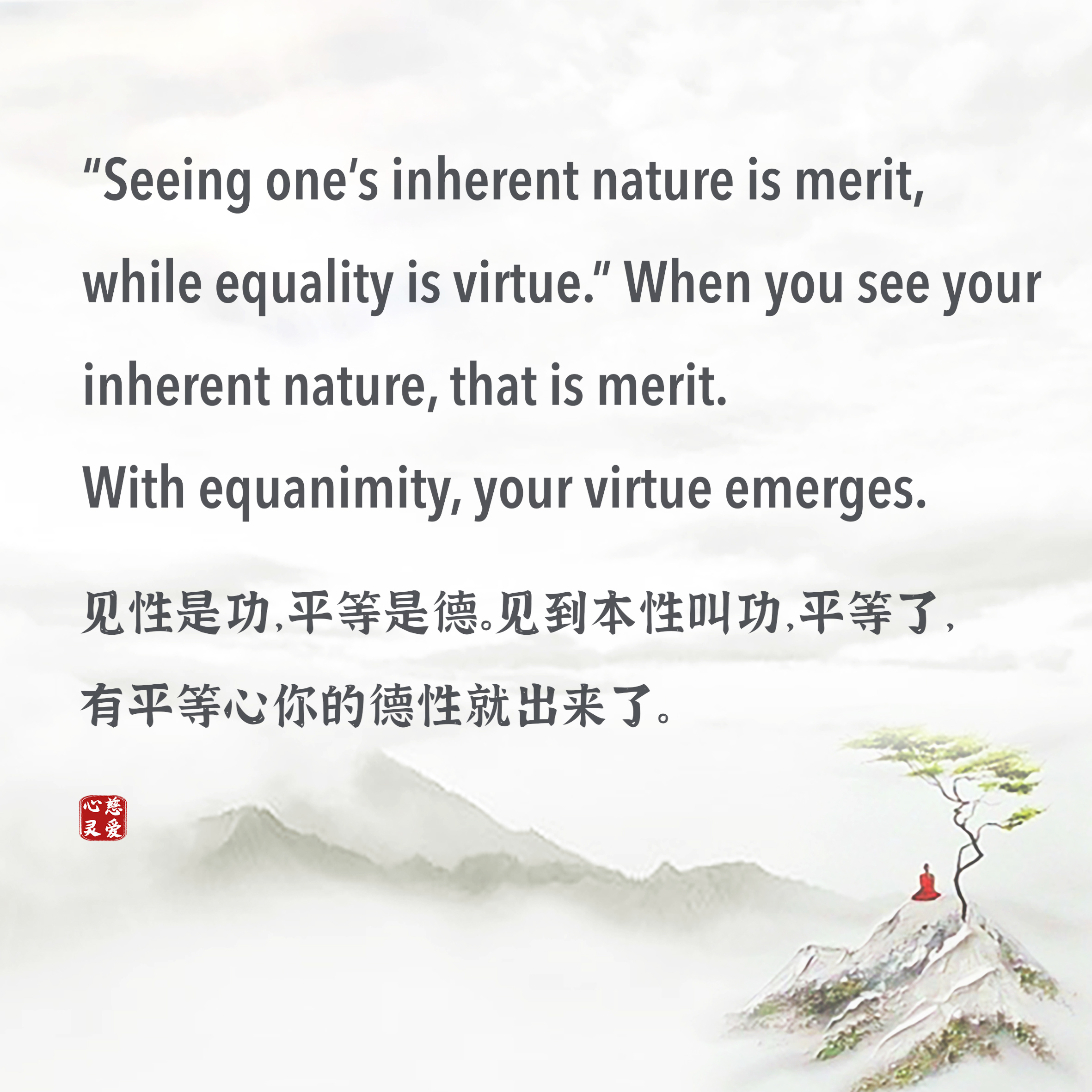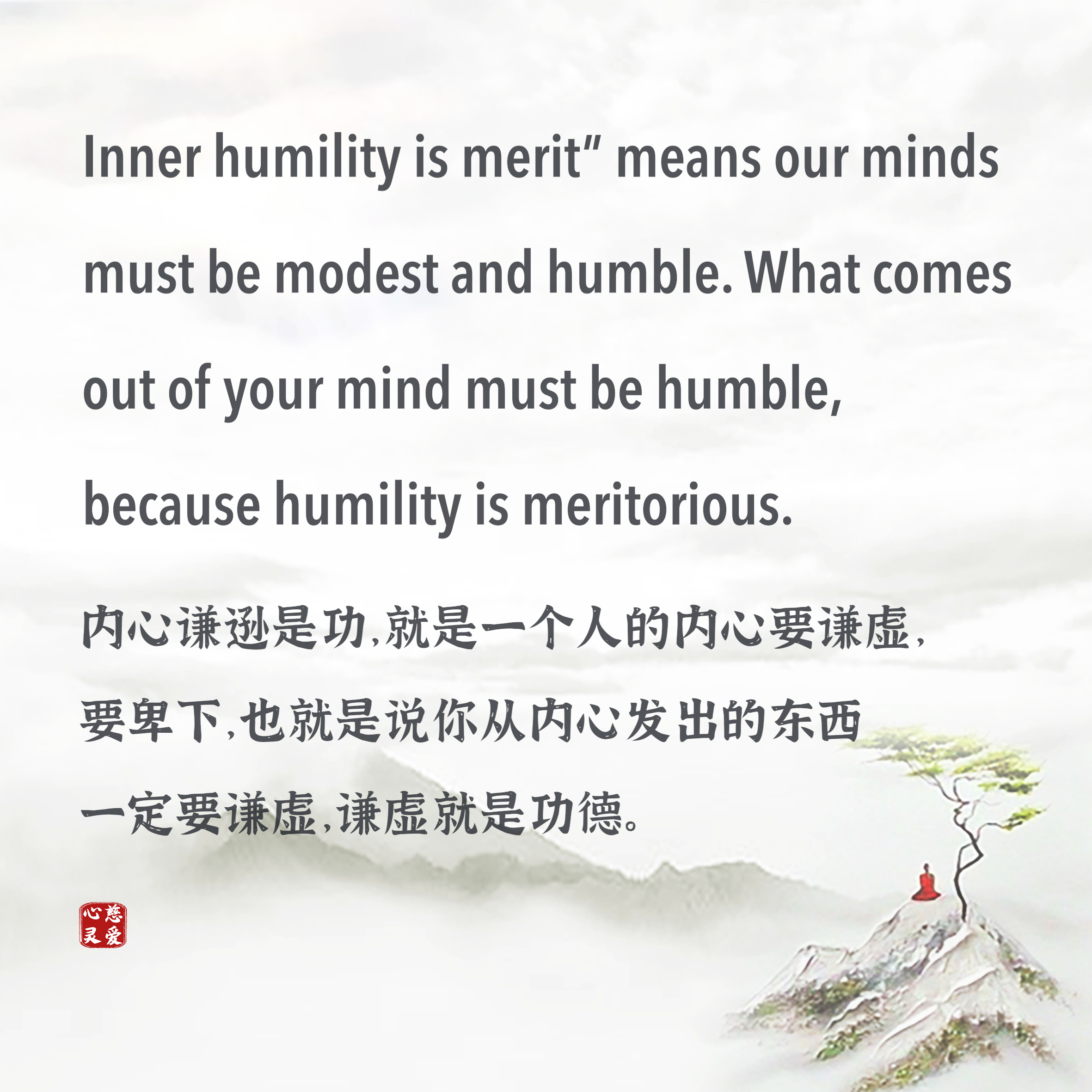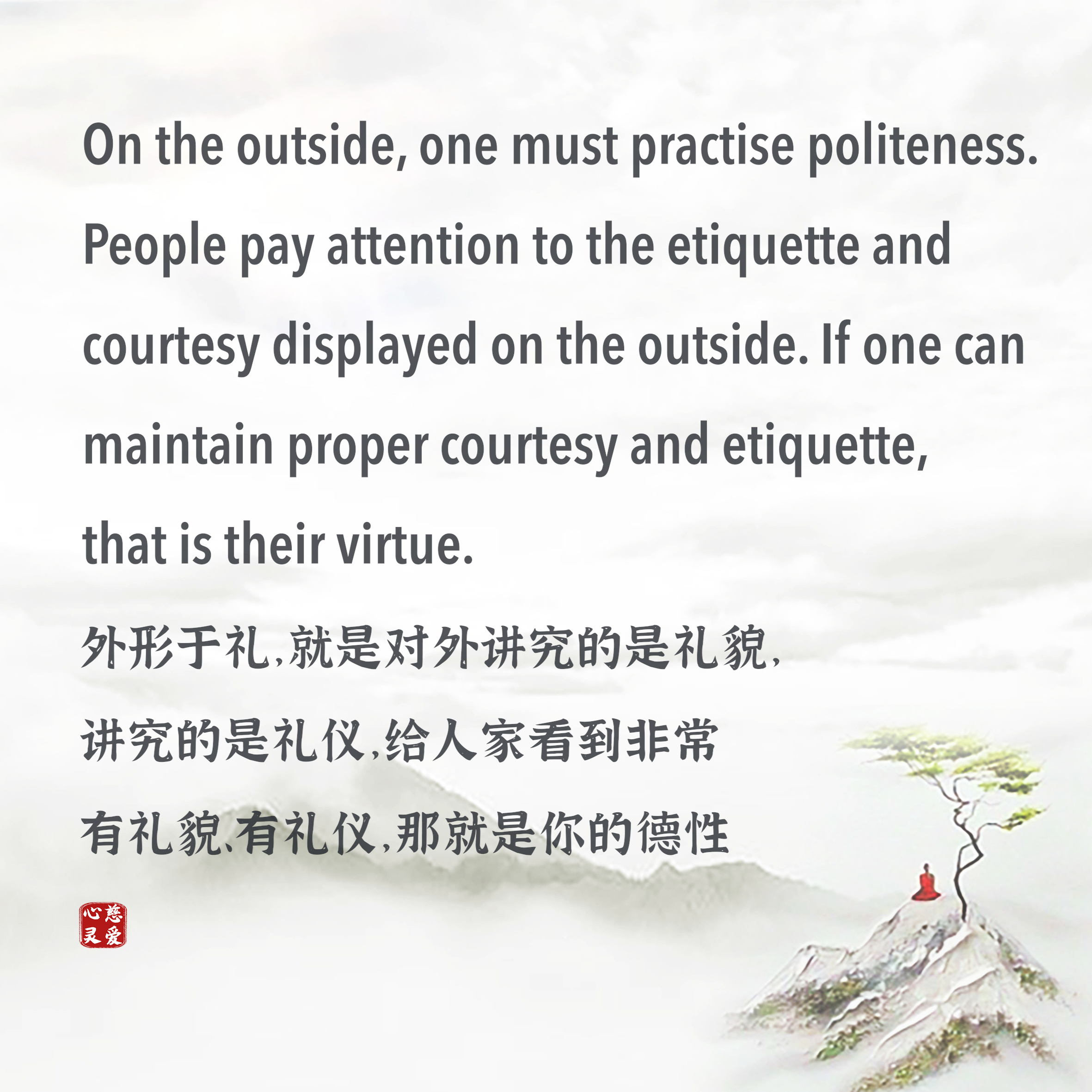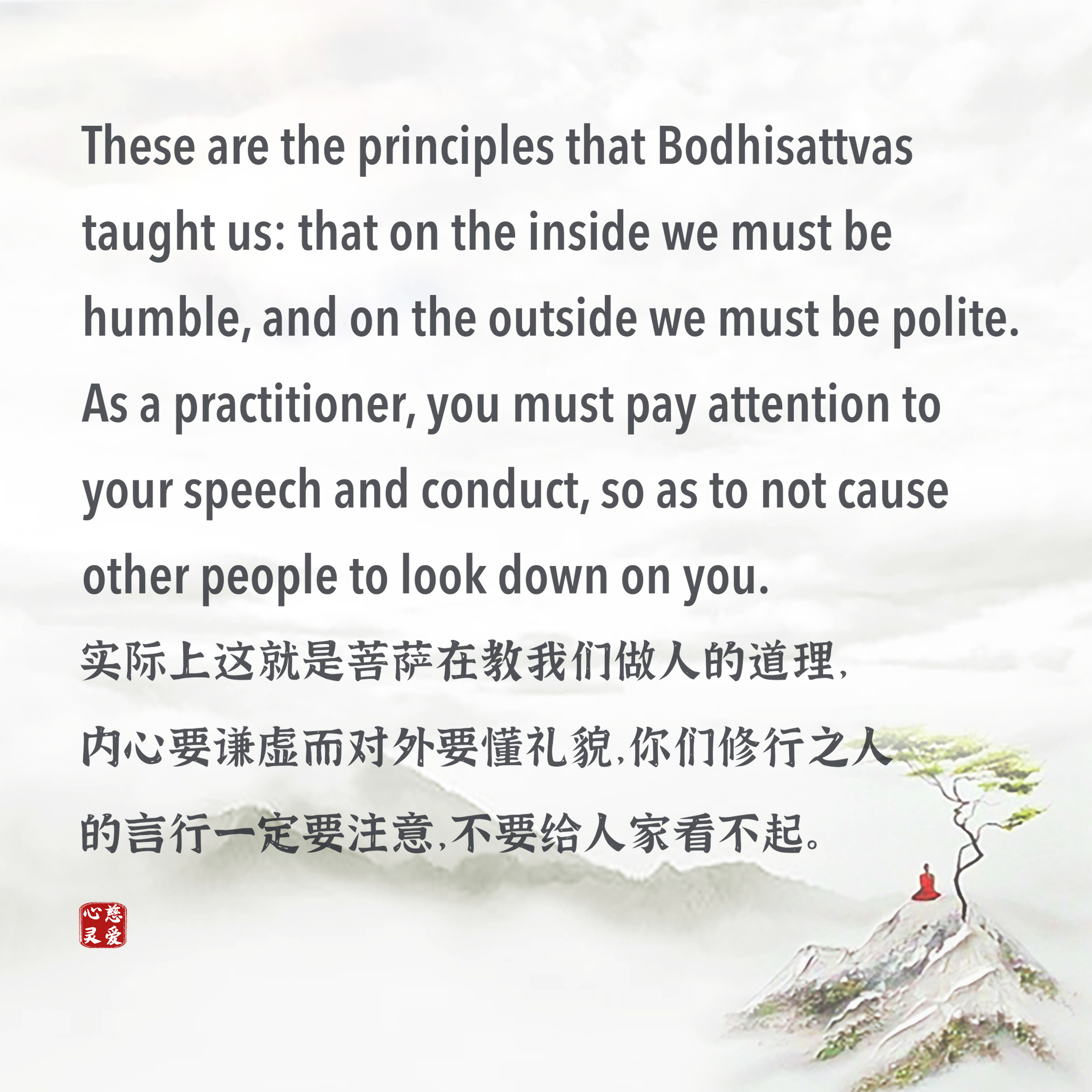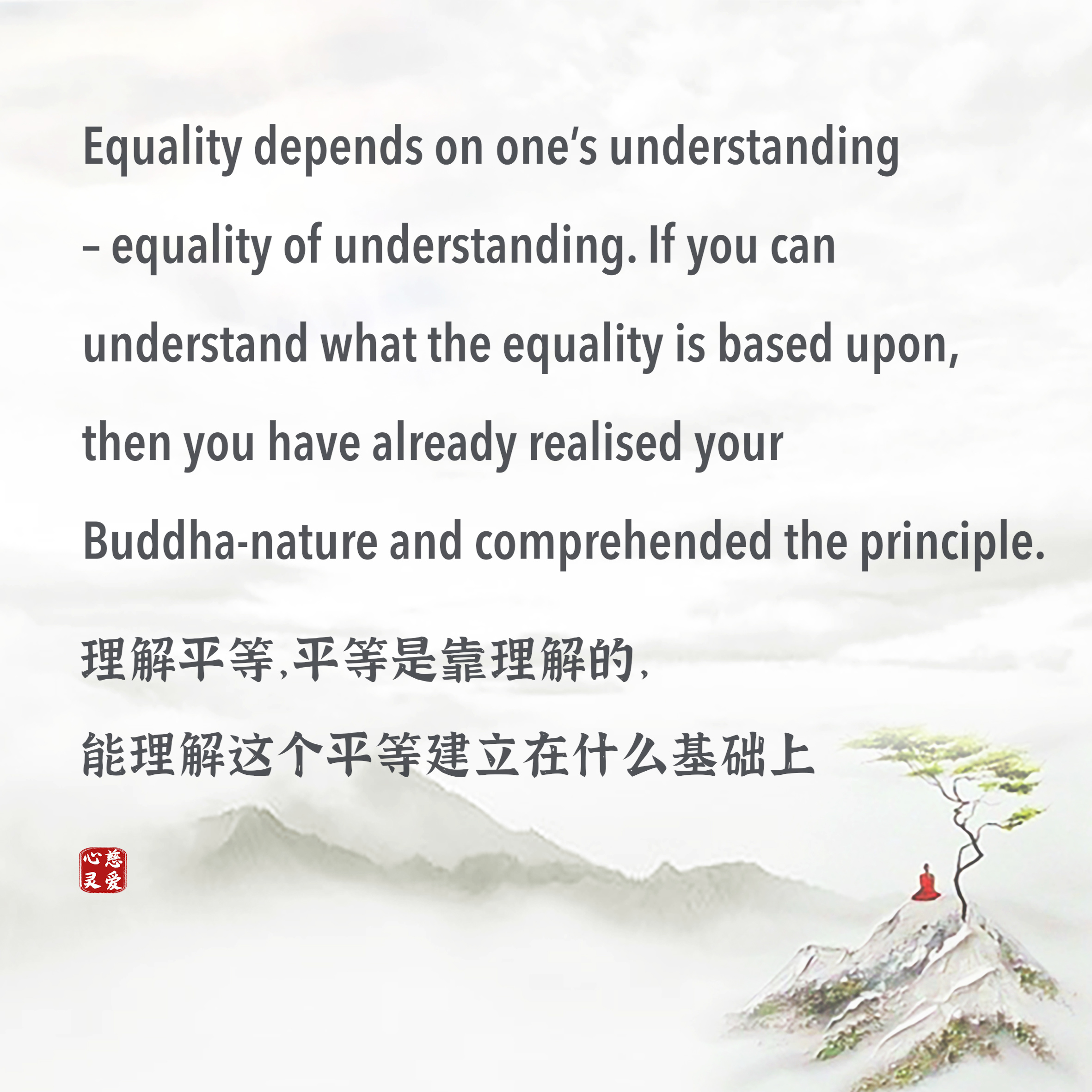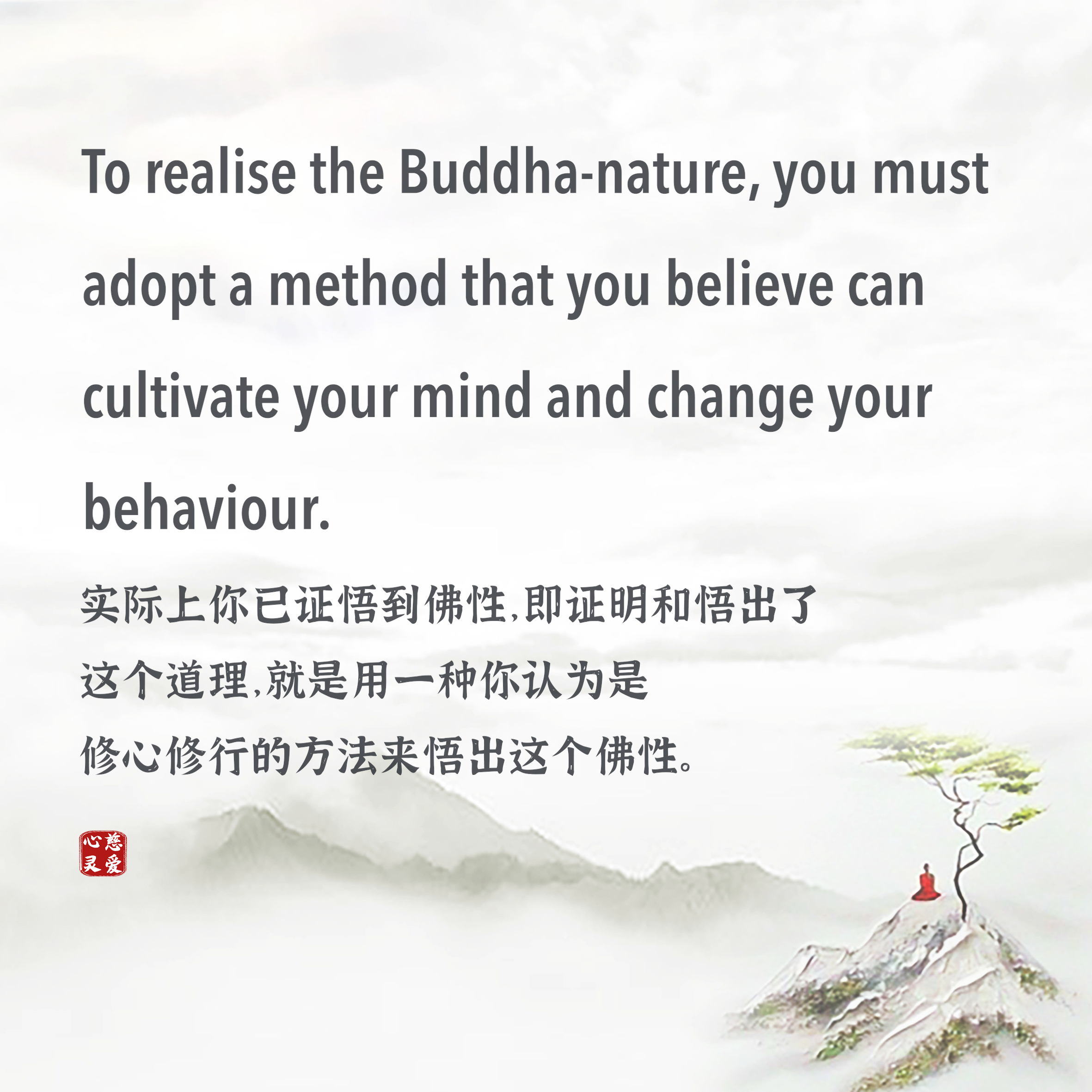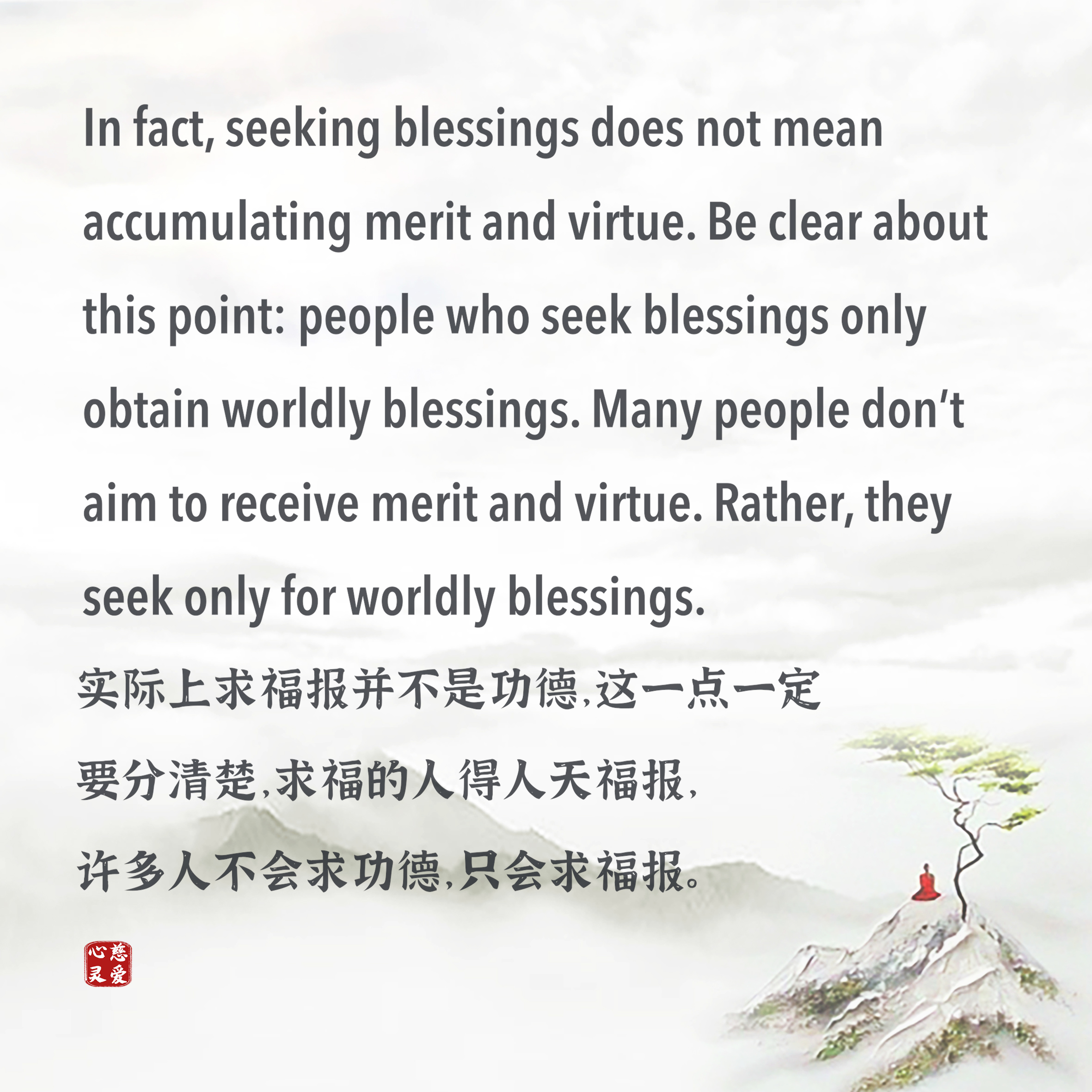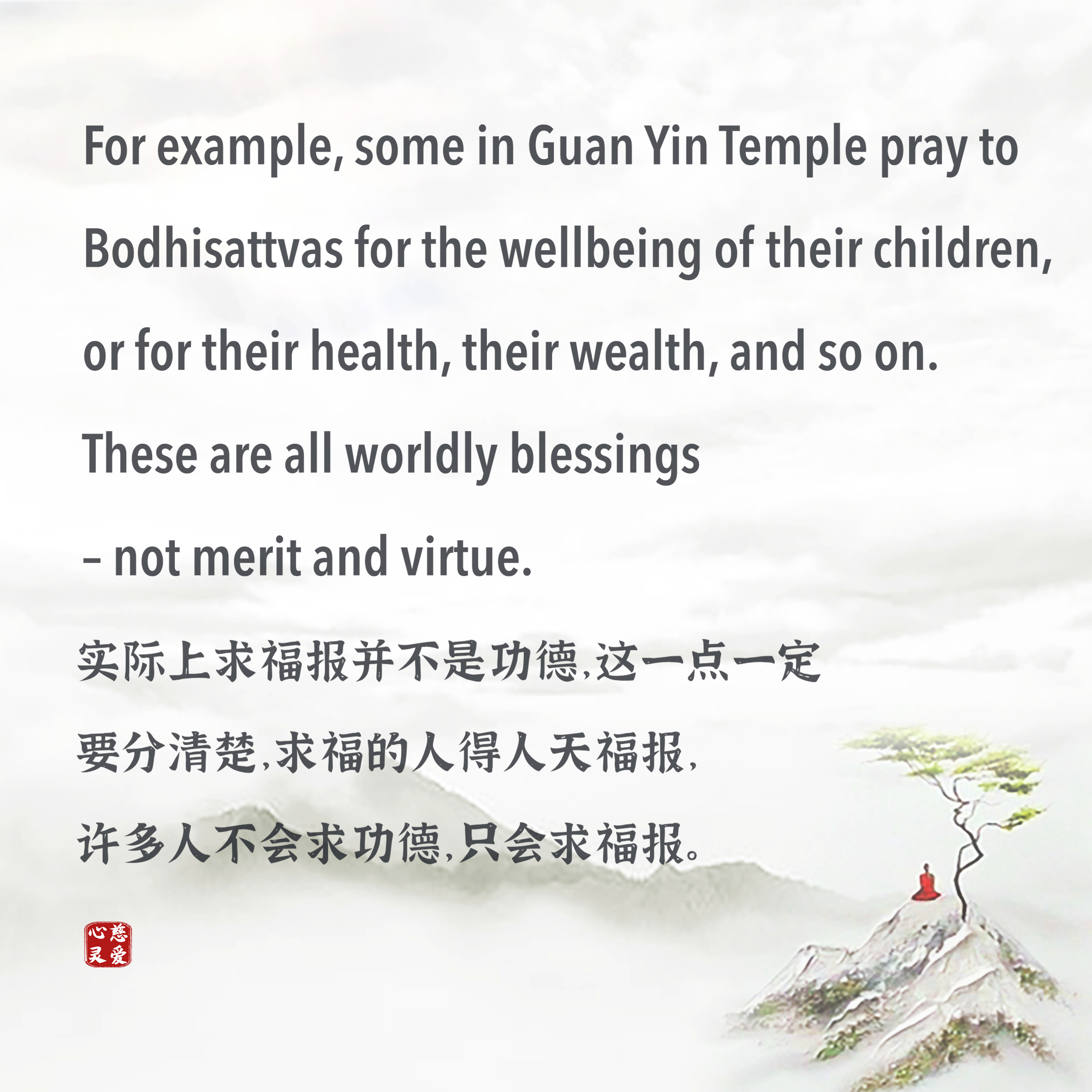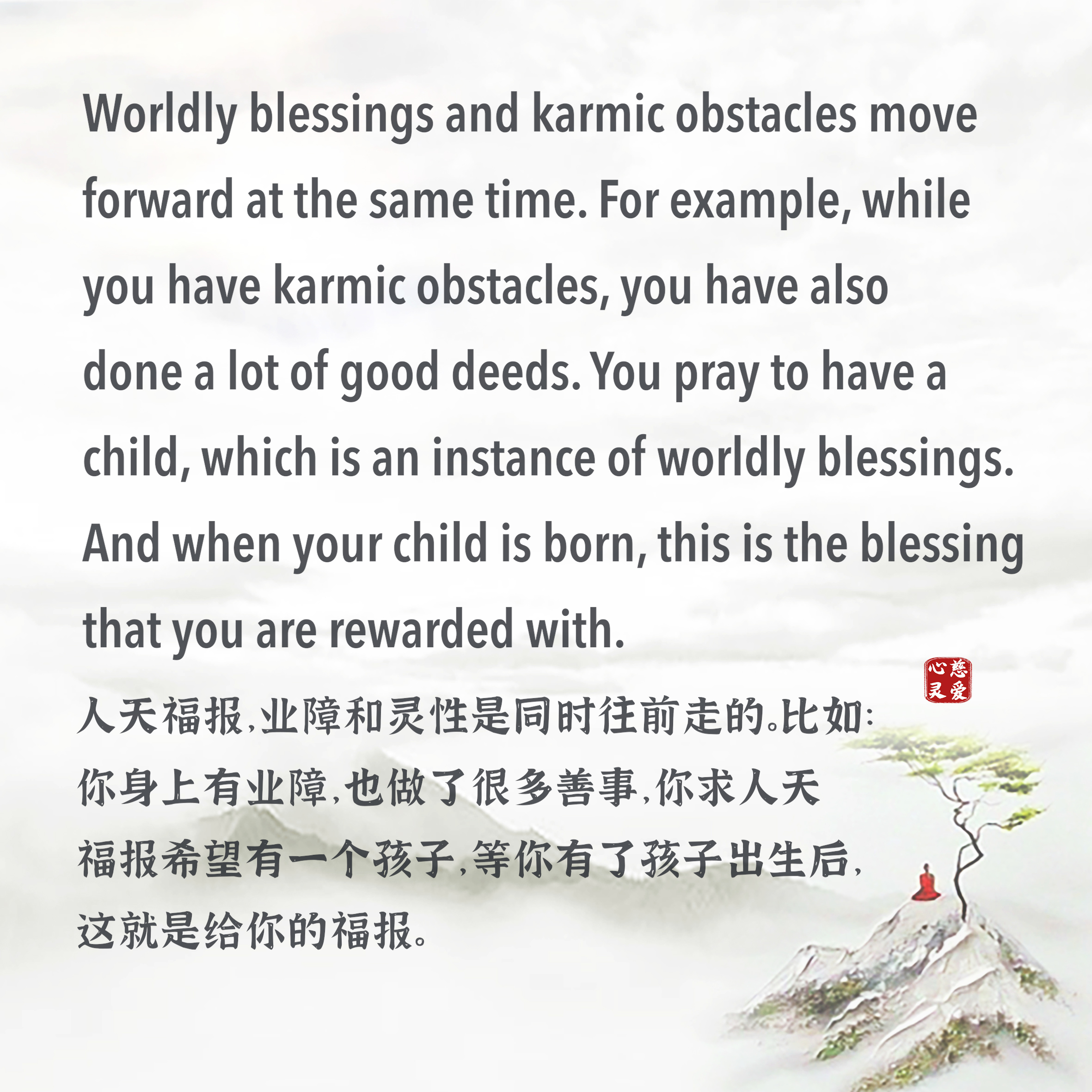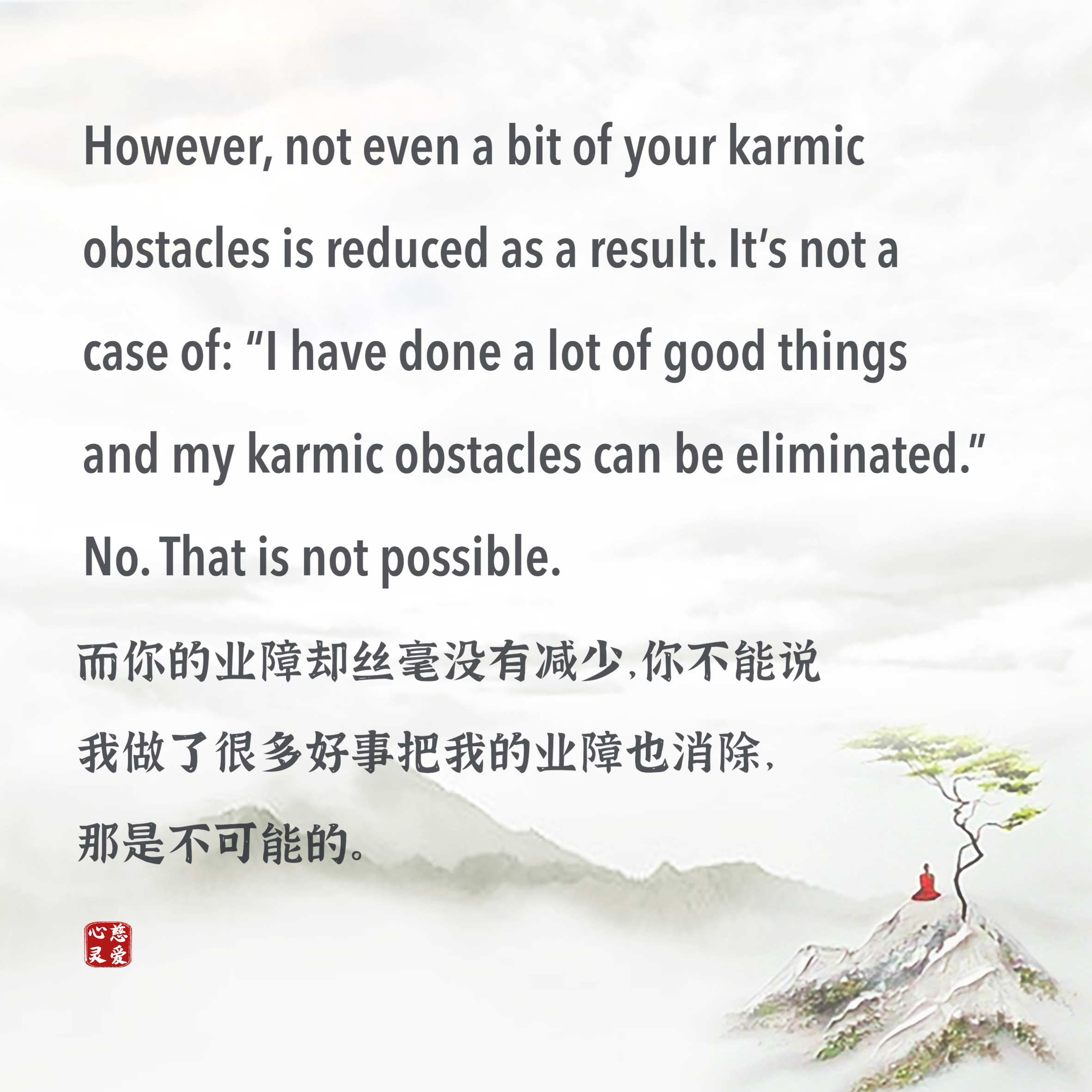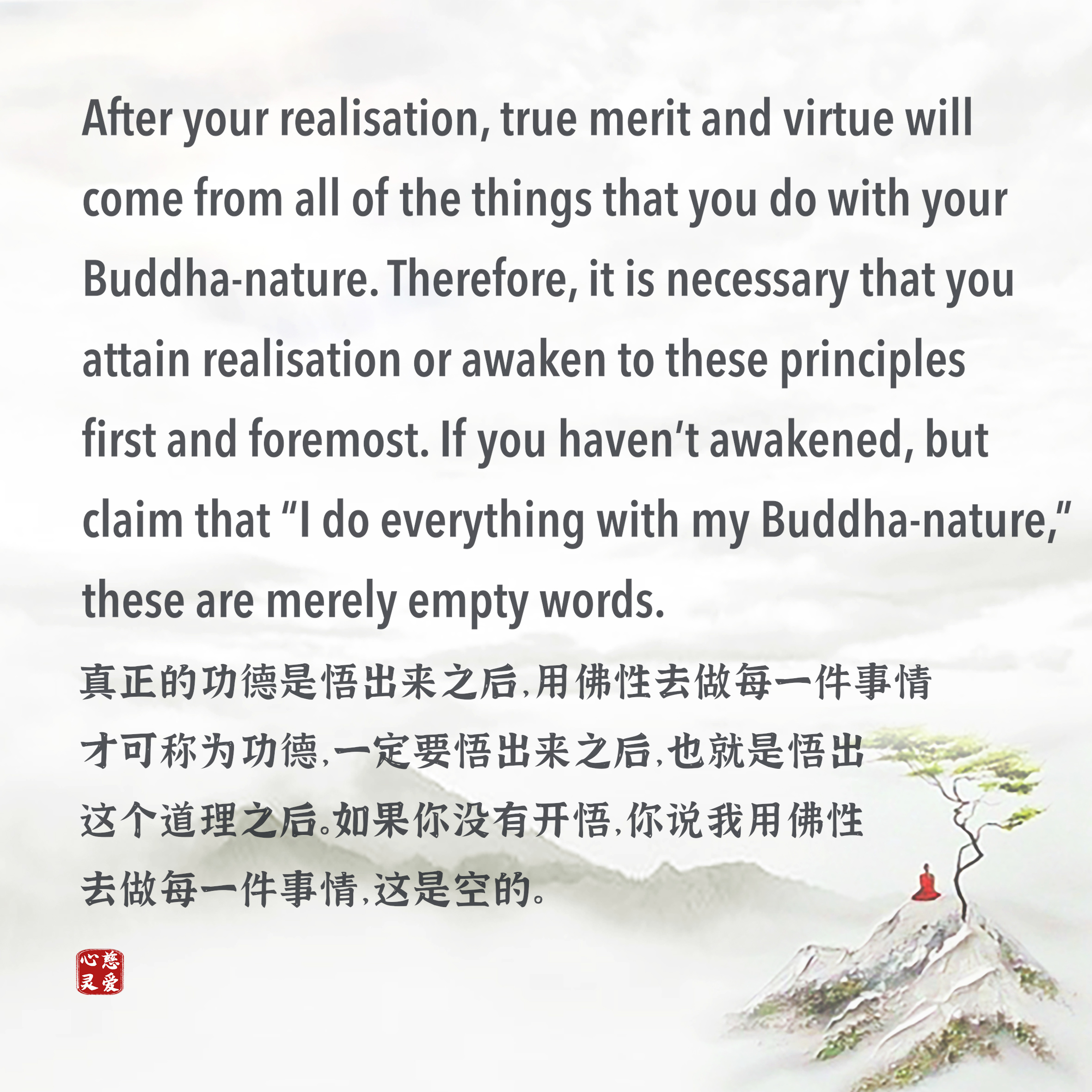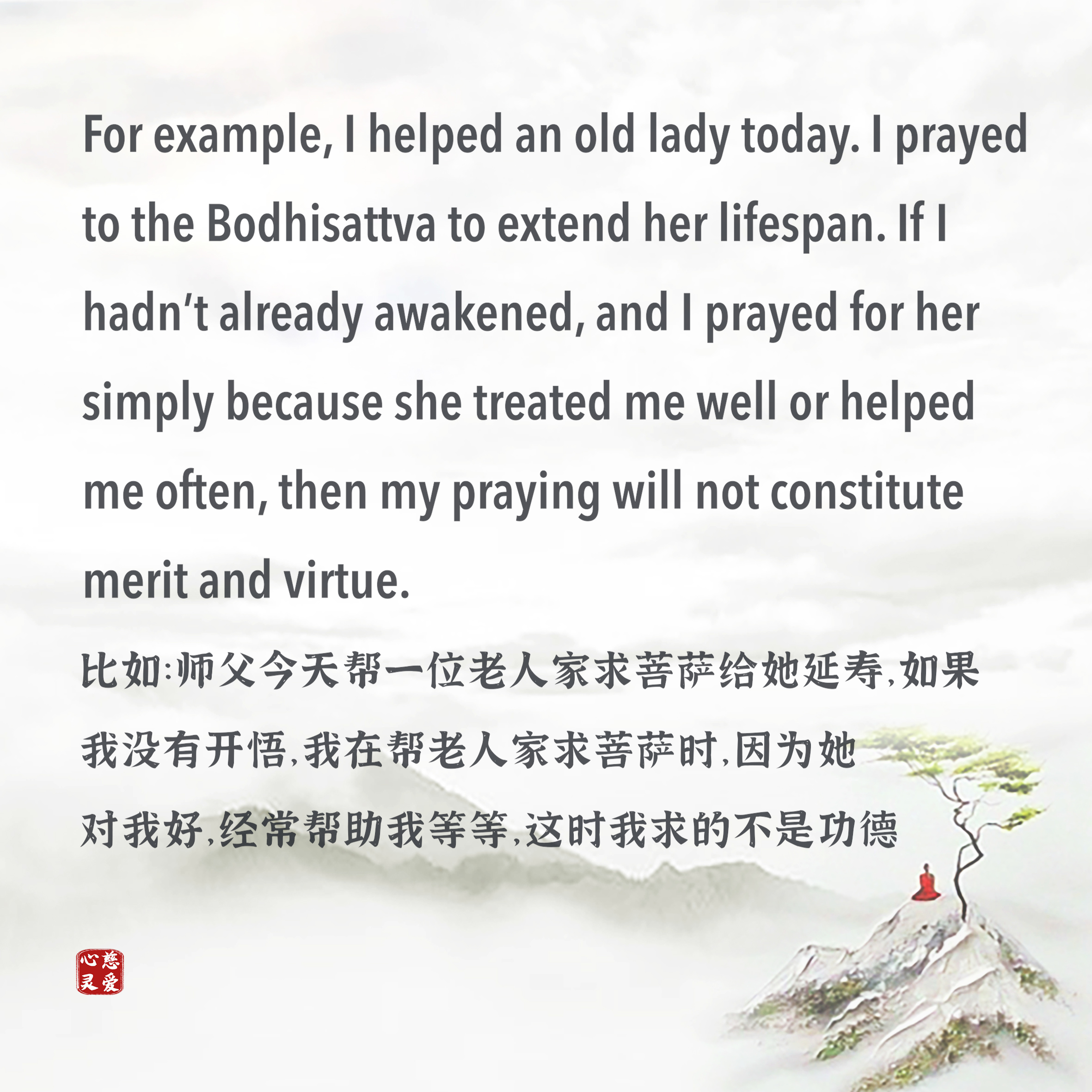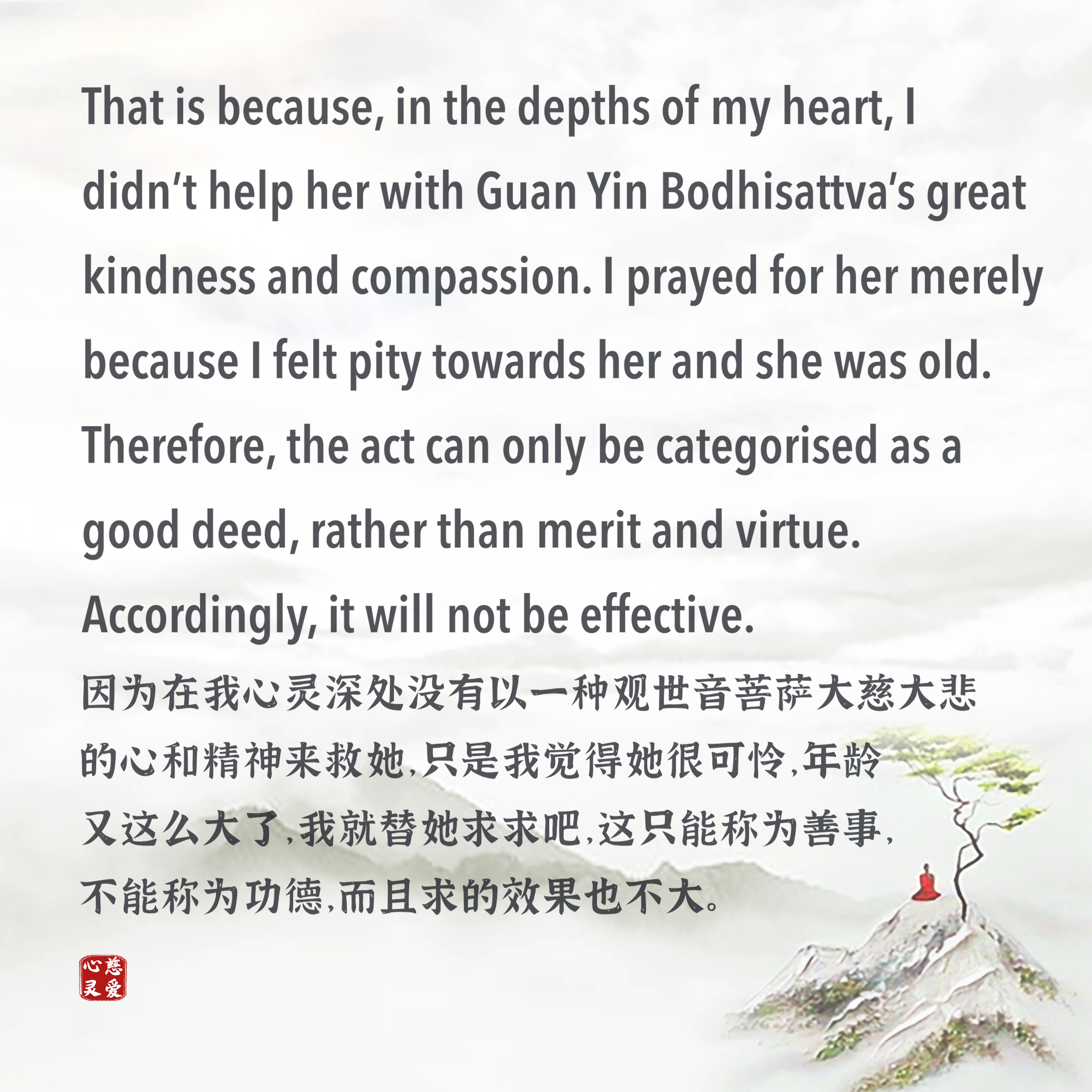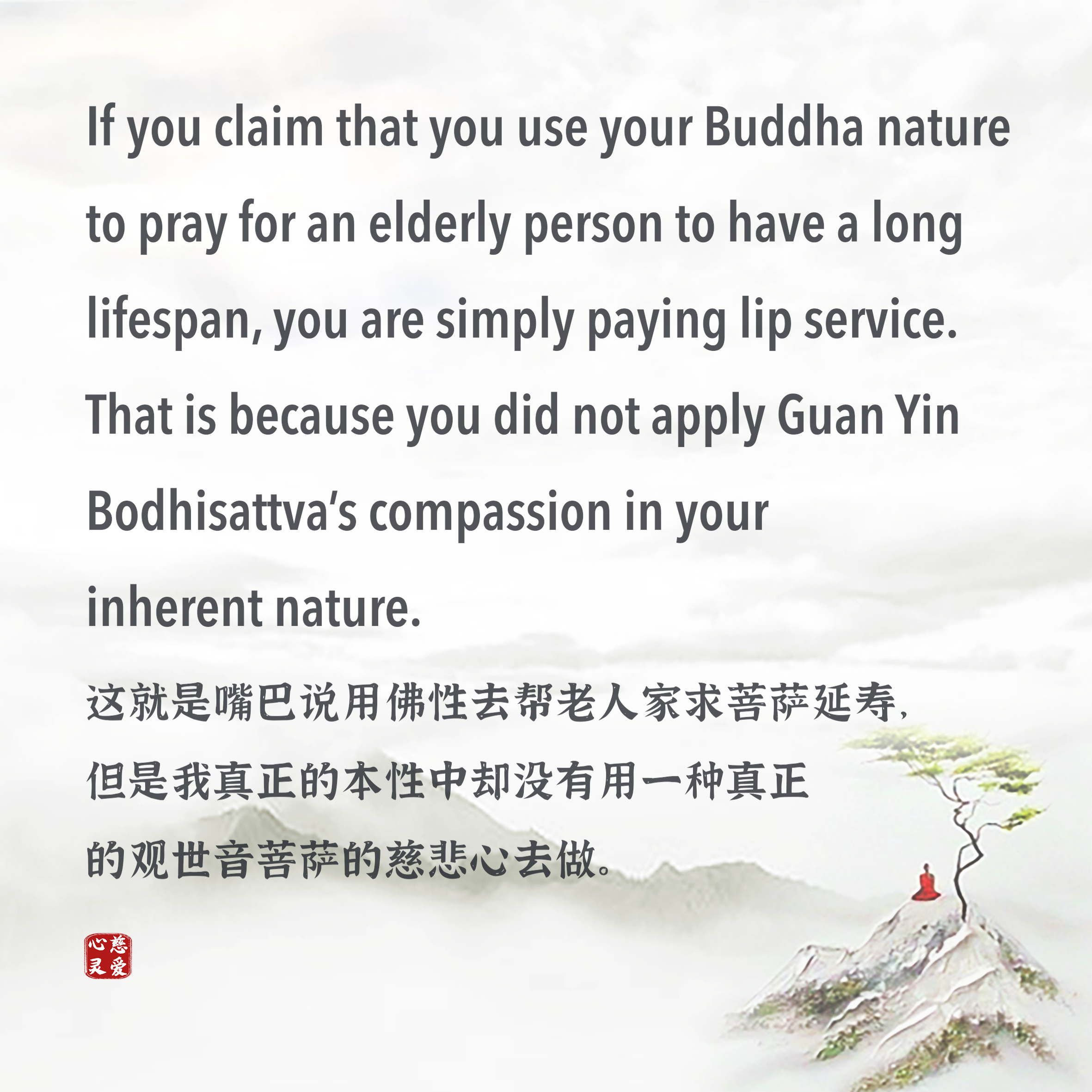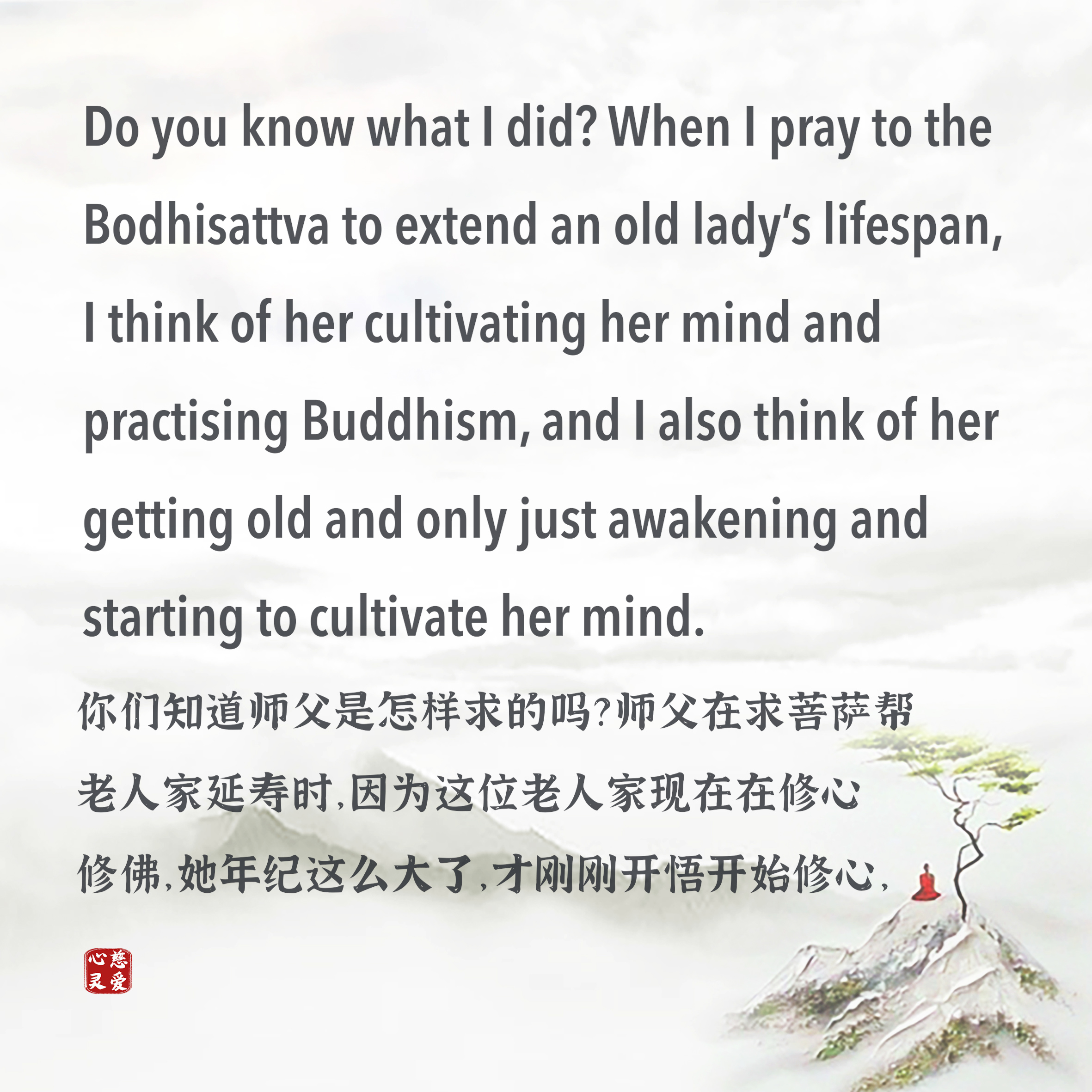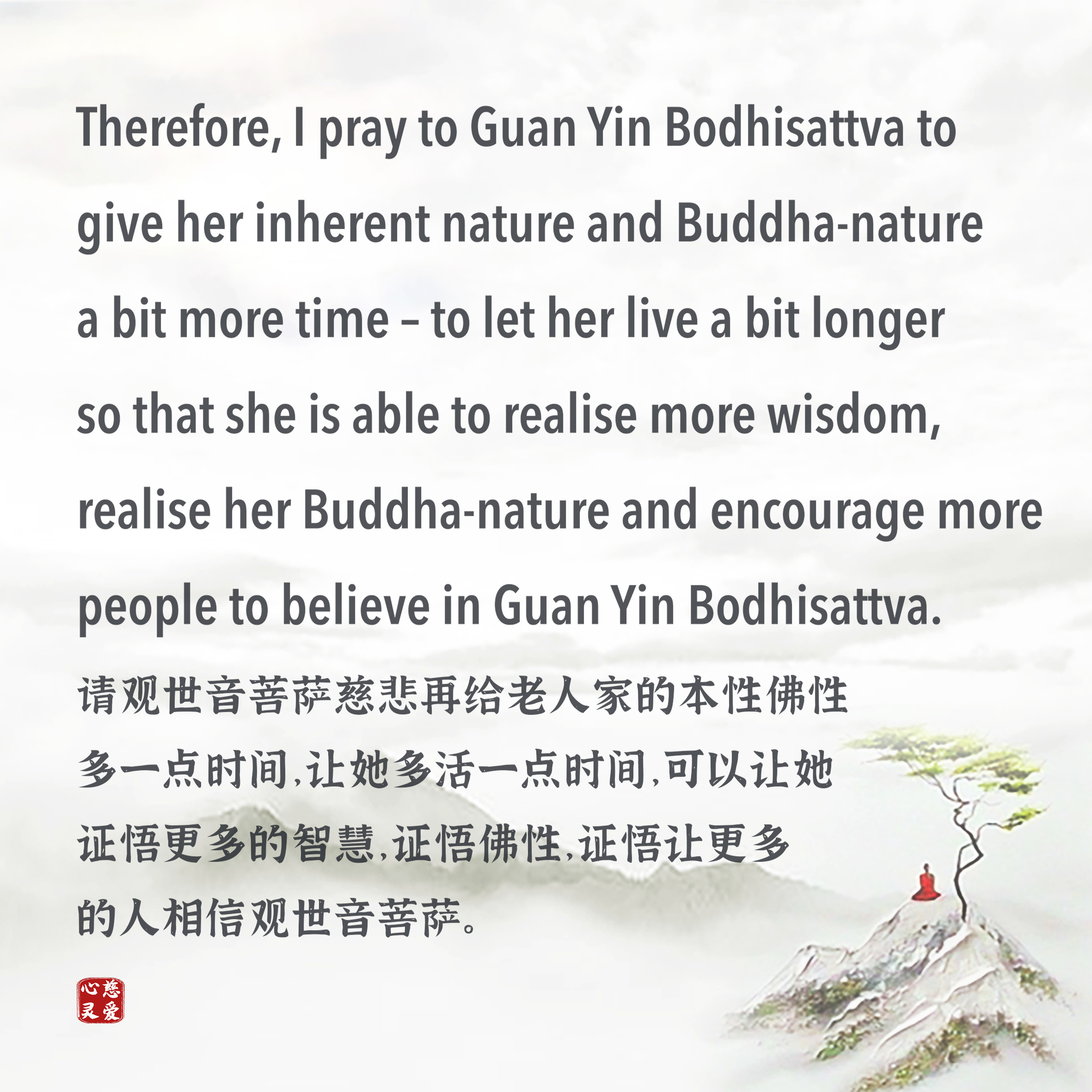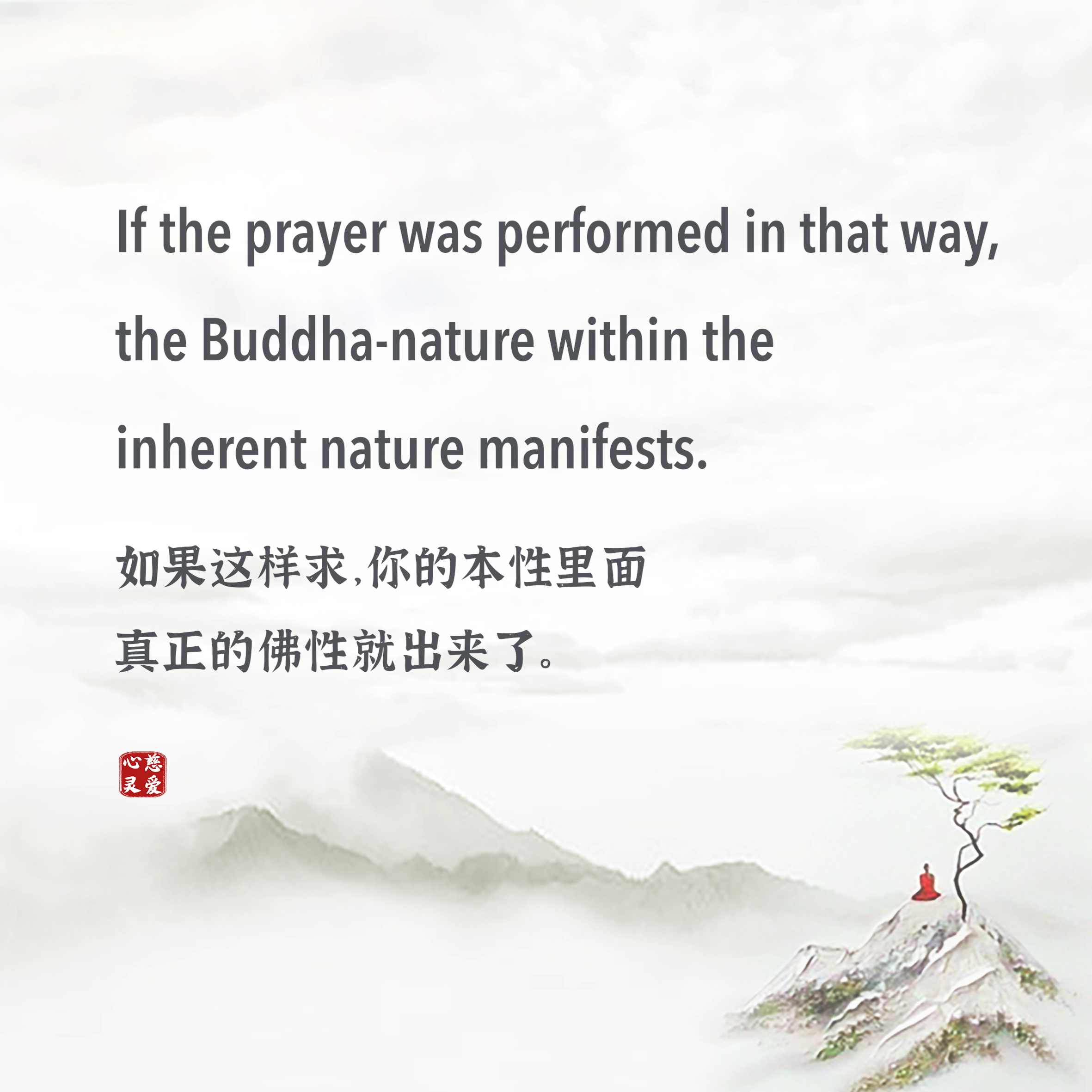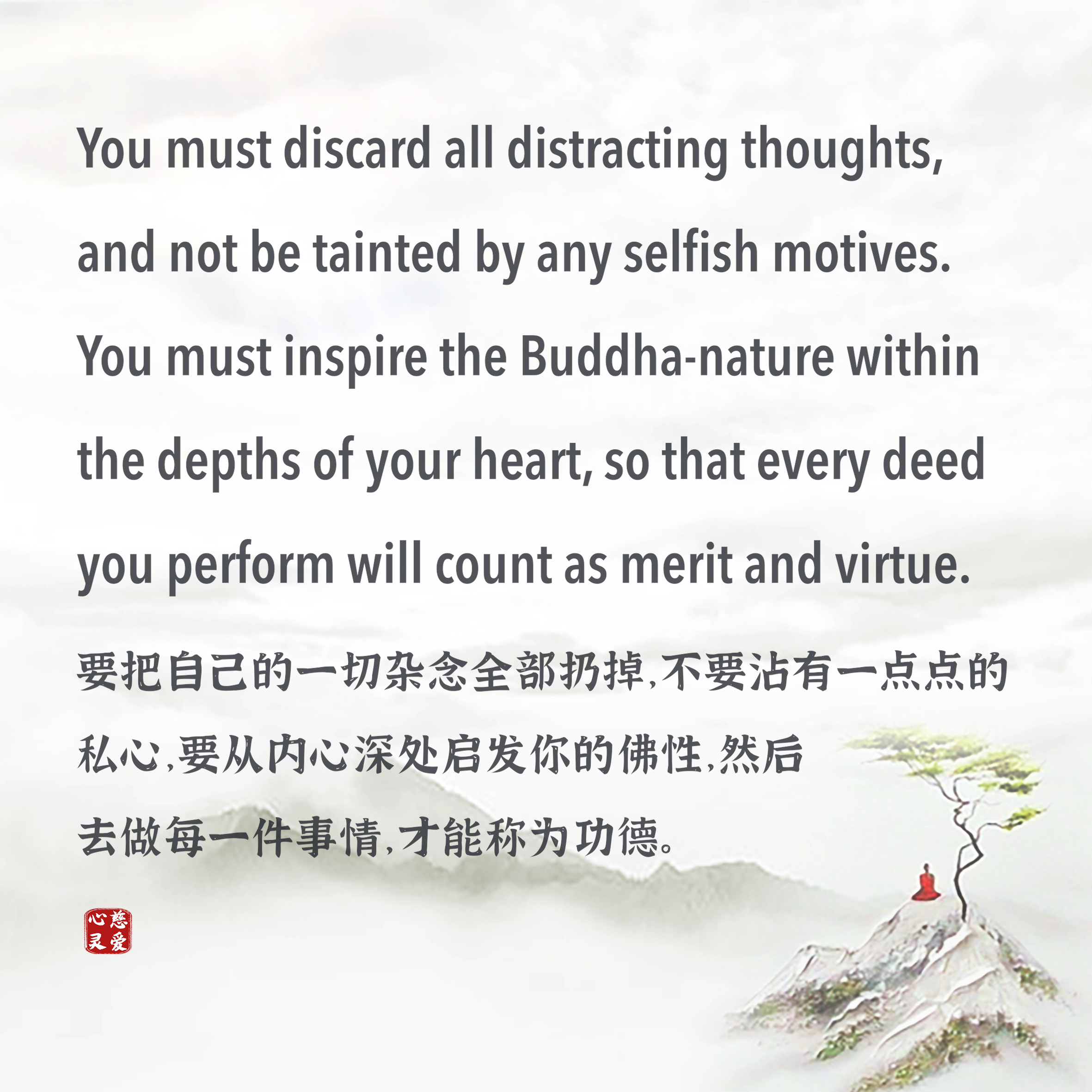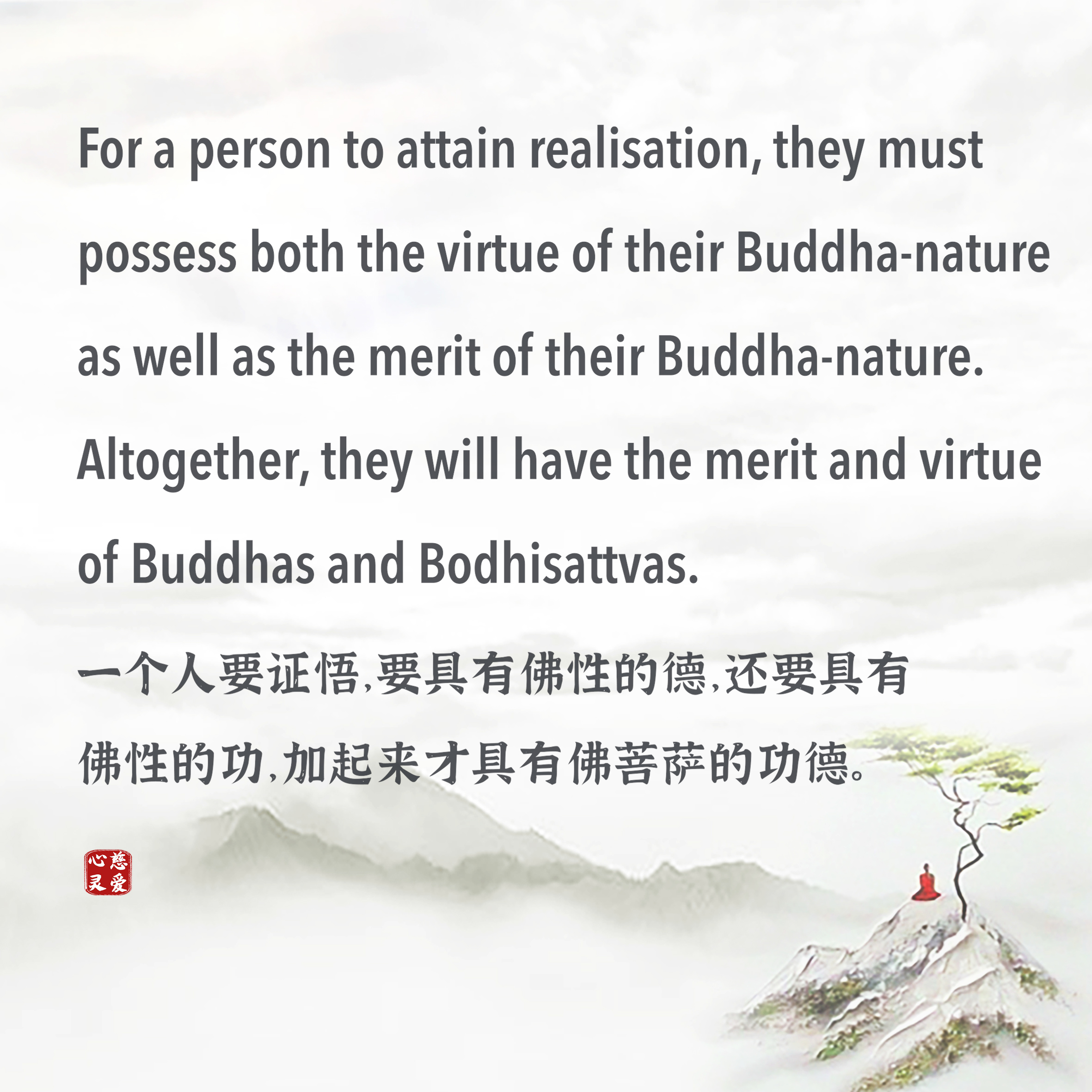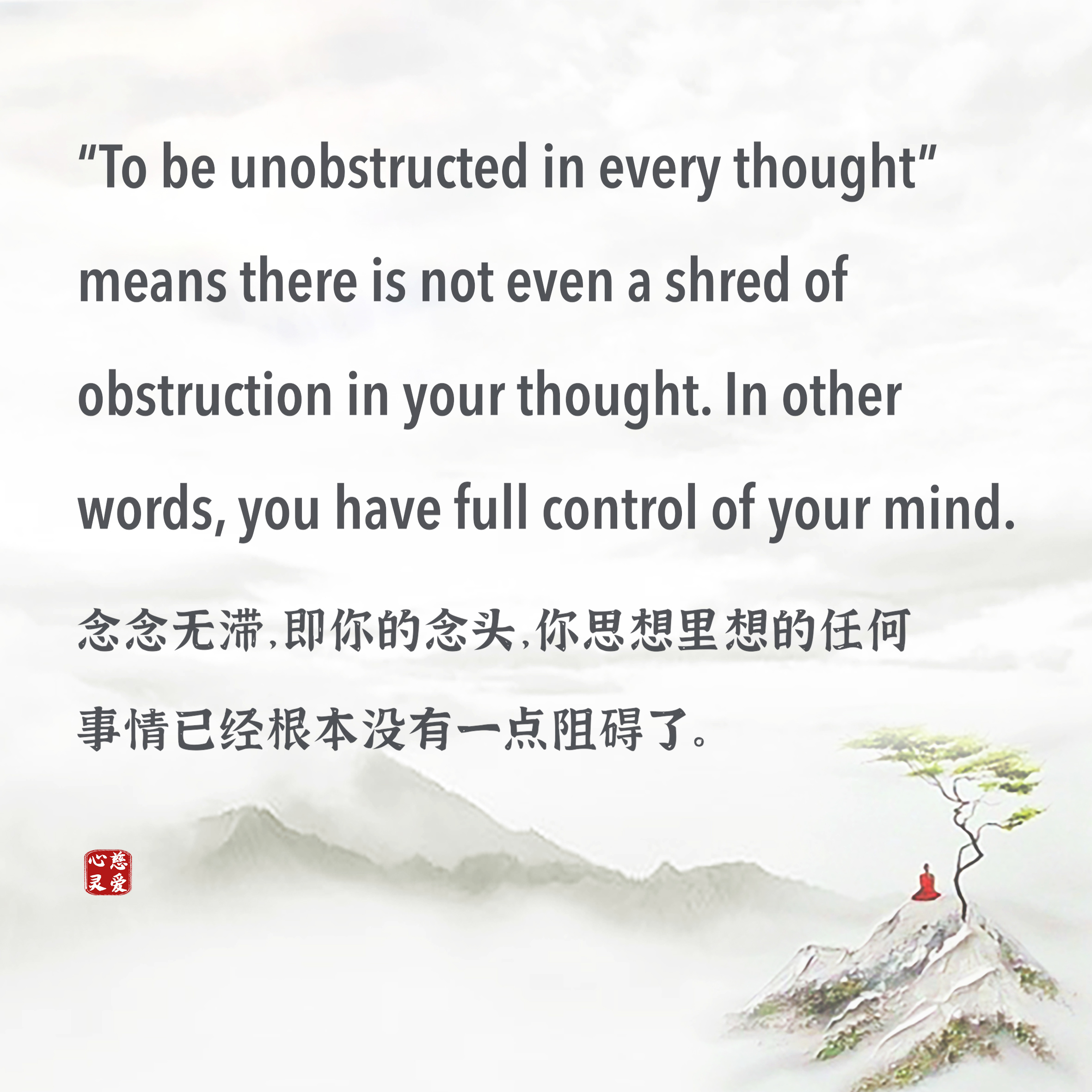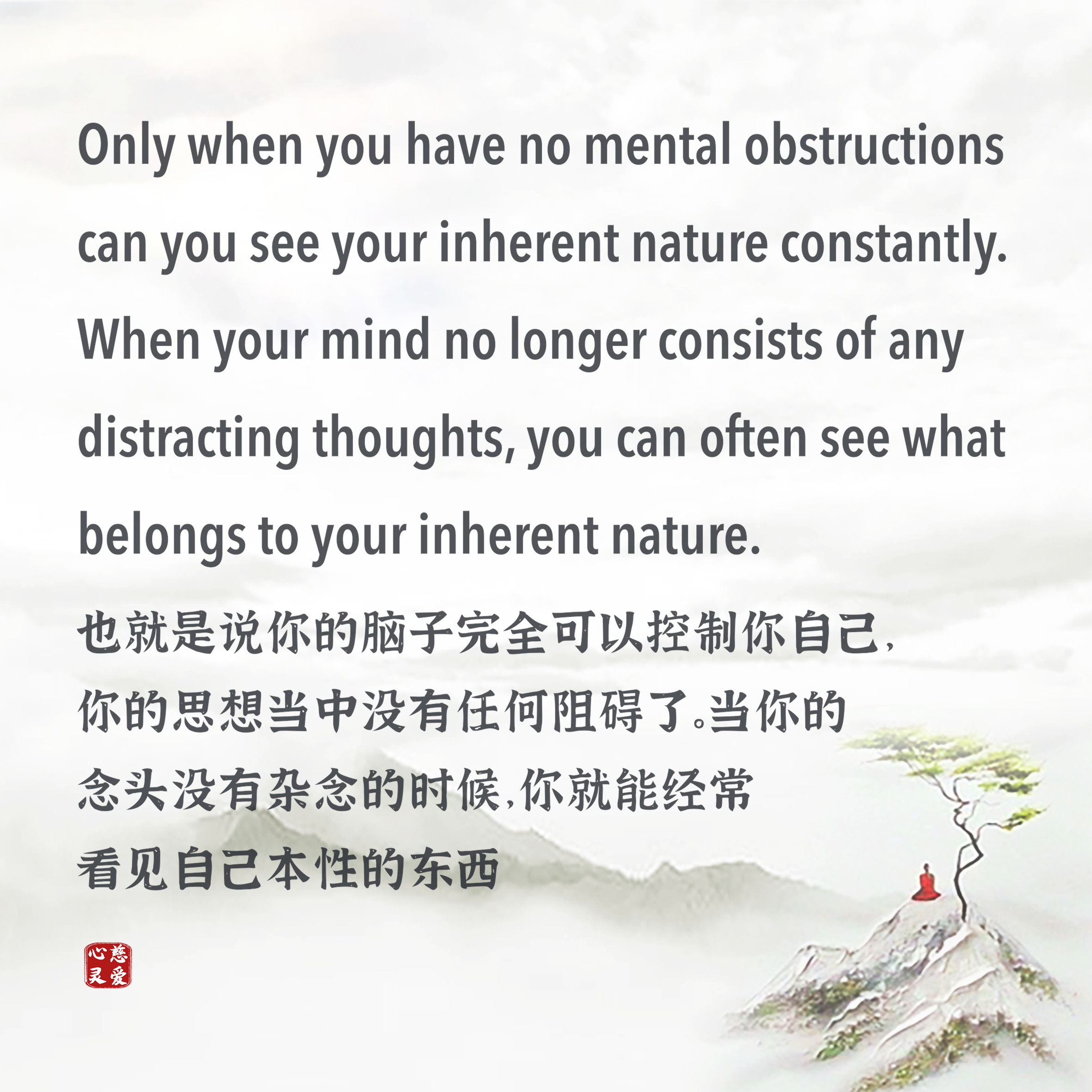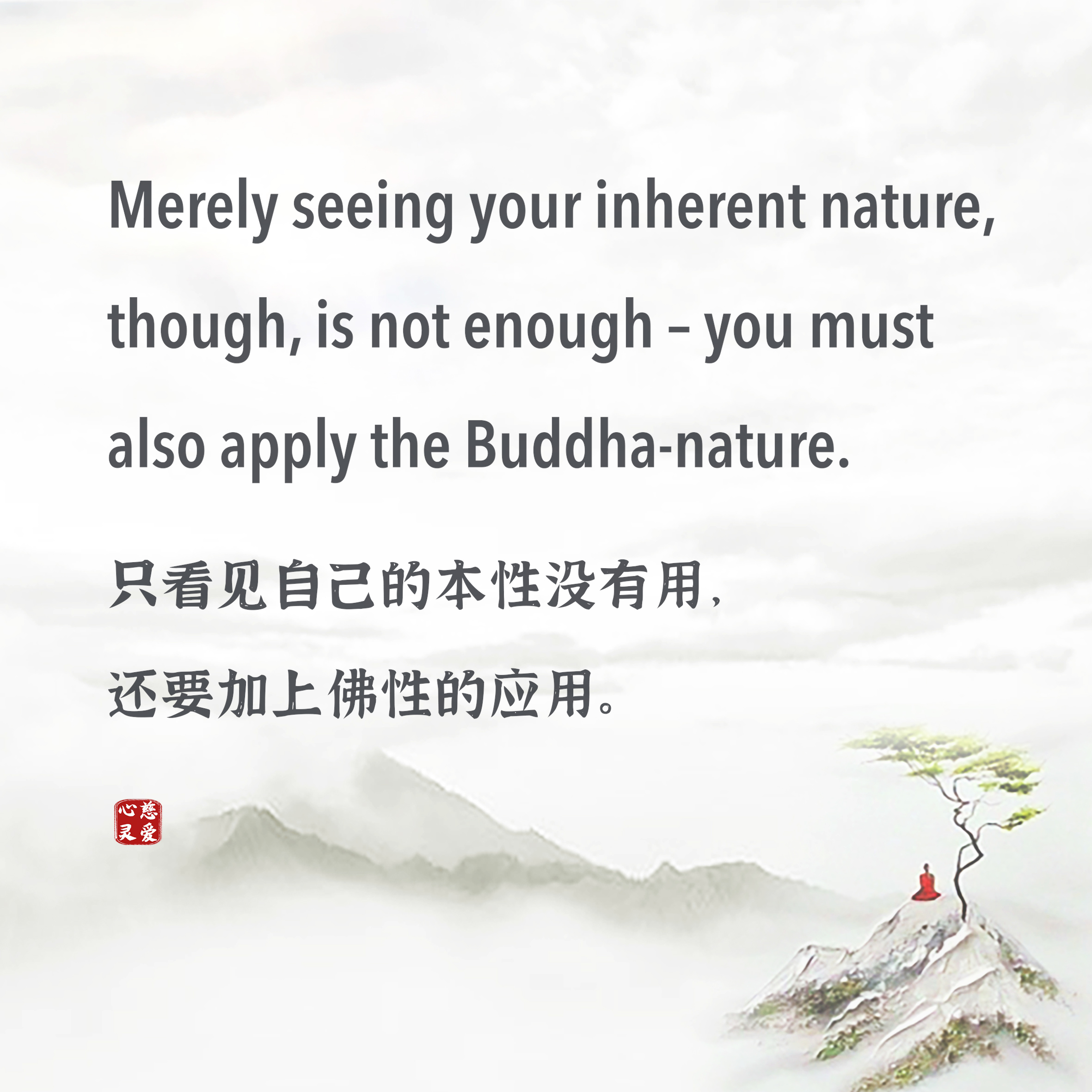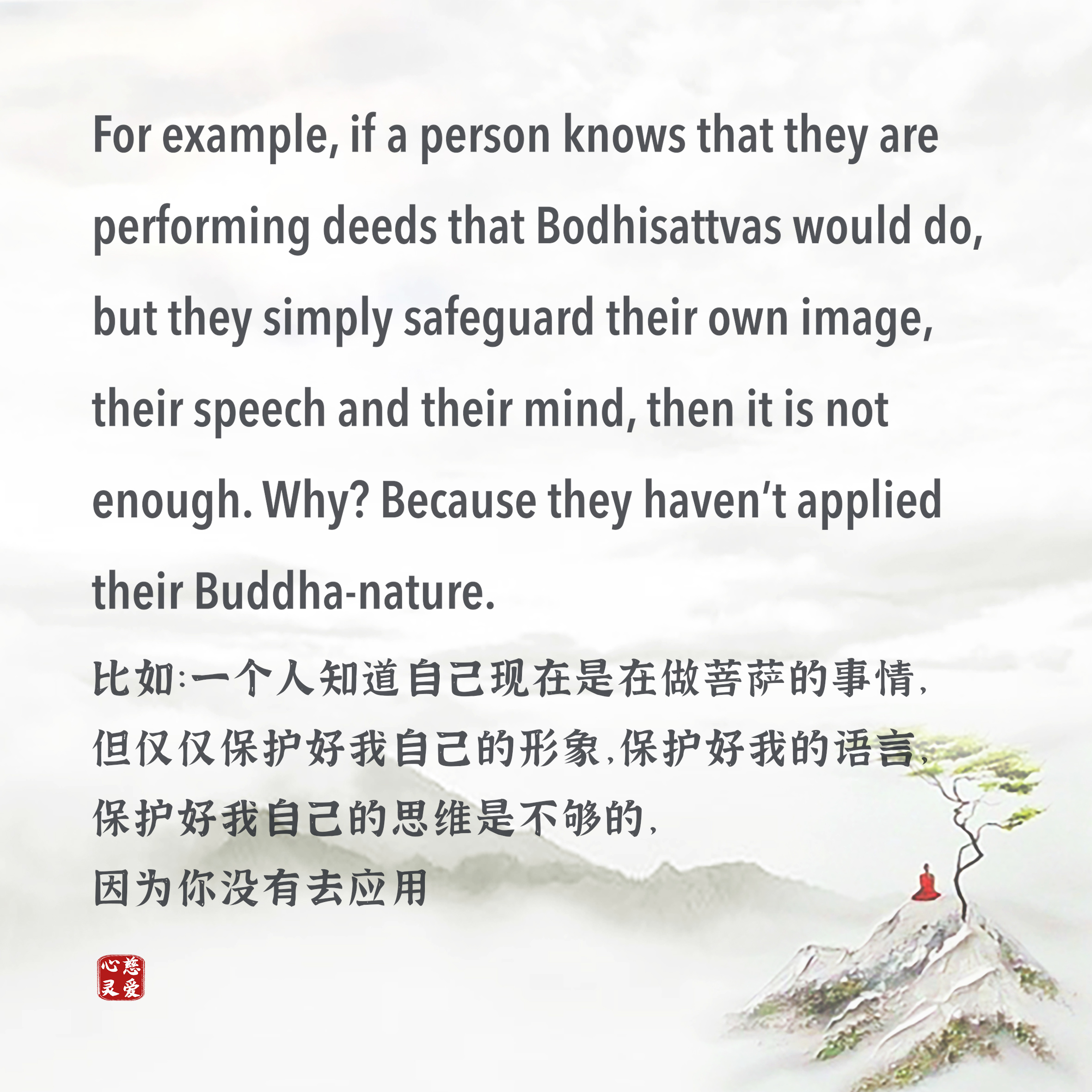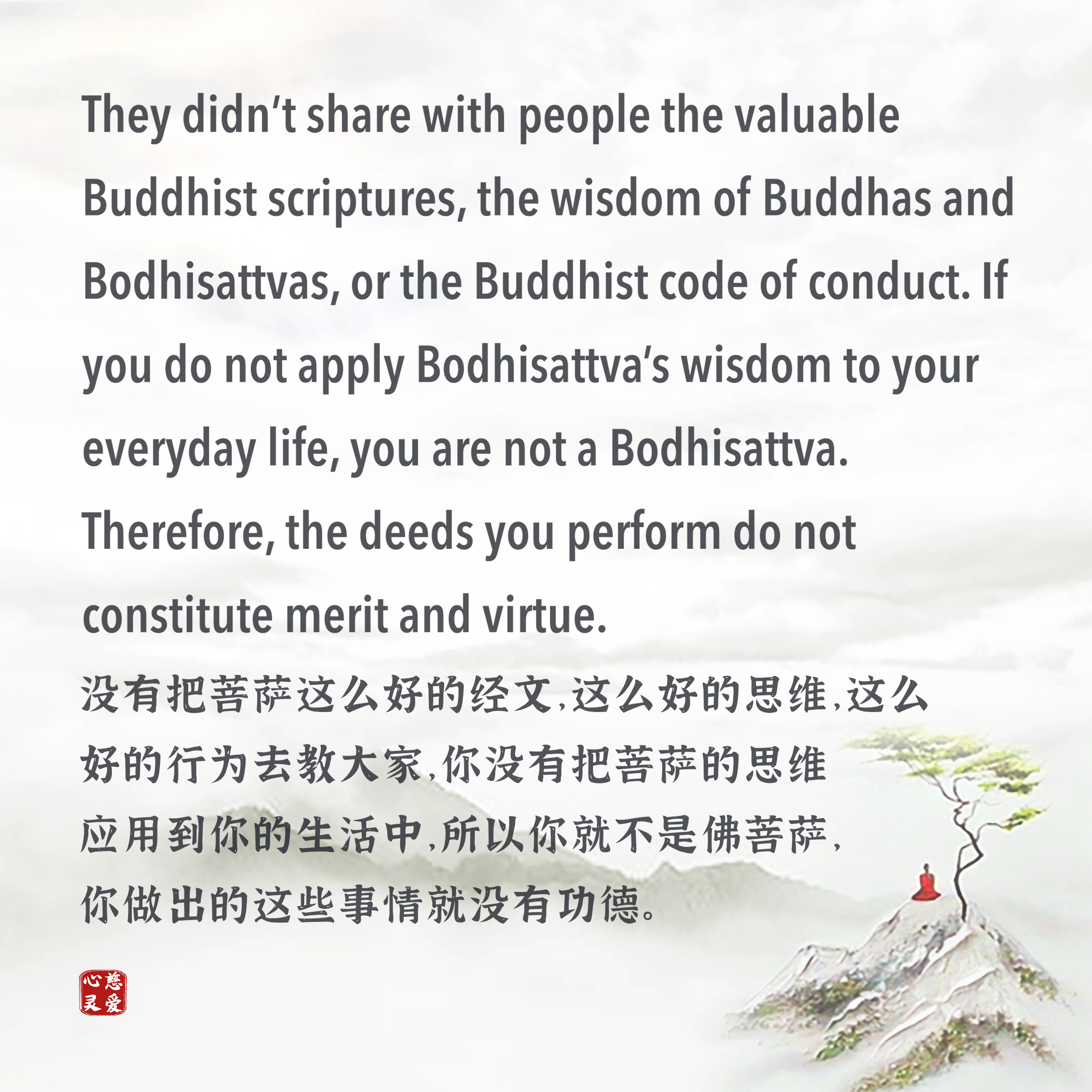Today, my topic is one we talk about constantly: Merit and virtue. But what is it? Why are good deeds different from merit and virtue? Why is that the latter can help eliminate karmic obstacles, whereas the former cannot? Why is that an action can sometimes be counted as merit and virtue, while sometimes it is a good deed?
今天给大家谈谈“功德”。我们天天讲功德,那么功德到底是什么?为什么善事和功德是两个概念?为什么功德能把你的业障消除,而你做的善事却不能把你的业障消除。为什么做同样一件事情有的是功德,而有的是善事呢?
When you have witnessed and verified the Buddha-nature, you have merit and virtue. Specifically, when you do a good deed, and do it from the bottom of your heart and with your inherent Buddha-nature, that is merit and virtue. You were able to realise your Buddha-nature while doing the deed. In other words, when performing a good deed, if you can sense that it is something that Bodhisattvas do, then that is Buddha-nature. You have witnessed and verified the Buddha-nature. You receive the reward for doing something, so you have witnessed and verified the Buddha-nature. If you acted like a Buddha for one hour in the Human Realm, then everything you did in that period would be considered merit and virtue. If you acted like a Bodhisattva for half an hour in the Human Realm, saving and spiritually awakening others, then everything you did in that period would be considered merit and virtue. For example, while you shared Dharma with others, you felt that you were like Bodhisattvas trying to save others. You felt pity towards them, and genuinely wanted to save them. Therefore, everything you said and did was merit and virtue. On the contrary, if you were motivated by selfishness and self-gain, or you did it because they were your friends and relatives, then even if you have put a lot of effort in, it’s still counted as a good deed – with not a shred of merit and virtue.
见证到佛性即功德。用白话讲,就是你做一件善事,如果是从内心发出的,而且是用本性具有的佛菩萨的佛性来做这件事情,就是功德。你能证悟到做这件事情的佛性,也就是说你在做善事的时候,你能证悟出来,你能感受到,这是菩萨做的事情,那就是佛性,你见证到了佛性,你也做了这件事情你得到了回报,你是不是见证了佛性?你在人间做一小时的佛,你所做的事情就是功德,你在人间做半个小时的佛菩萨救度人,你所做出的事情全部是功德。比如你今天给大家说法时,你当时感觉自己像菩萨一样在救度人,你从内心觉得他很可怜,我真的要救他,你与他讲的所有的话,做的事就全部都有功德。然而如果因为他是你的亲属或朋友或你因带有私心和自身利益,尽管你讲得很努力,但全部都是善事,了无功德。
From the perspective of one’s inherent nature, once you realise your Buddha-nature and then apply it to anything you do – anything at all relating to Buddhas and Bodhisattvas – then it’s merit and virtue. Note that for any person who owns the Buddha-nature, once they recognise the Buddha-nature and then apply it in the real world, that’s merit.
从本性来看,见证了你的佛性加上你的应用,也就是说你在人间做任何事情时,做佛菩萨的事情时都是功德。
要记住:人转世投人了,如果这个人具有佛菩萨的佛性,而且证悟了佛菩萨的佛性,然后又实践了佛菩萨的佛性,就是功。
So what is virtue? Equality is virtue. Only with equanimity can a person emanate the light of great compassion and great mercy. Without equanimity, how could you do that? If Guan Yin Bodhisattva does not have equanimity, why would she come down to this Saha World to spiritually awaken sentient beings? It is because of the compassion and the virtue of equality she possesses that Guan Yin Bodhisattva comes to this world to save sentient beings. That’s why the virtue in “merit and virtue” is so important.
什么是德?德就是平等,一个人有了平等心,他才能散发出大慈大悲的光。如果没有平等的心,你怎么能散发大慈大悲的光?观世音菩萨如果没有一种平等的心,怎么会下来救度娑婆世界的芸芸众生?观世音菩萨就是因为有这个慈悲心,有这个德,而且是平等的德,才下来救度众生。所以功德的“德”字很重要。这个平等,师父过去给你们讲过是建立在什么基础上的?是建立在在你转世之后,是平等的,并不是代表你前世做了多少功,多少德。这个平等是大家共同享有一个平等学佛的机会,大家共同享有都具有佛性的特定条件,从这个条件上我们开始平等地修,你投到这个人间了就有机会平等的修,转世投人之后一切平等了,即众生皆具有佛性。菩萨讲的这个平等是建立在人人皆具有佛性这个平等上,并不是这个佛性在前世做了多少好事或坏事,今世投胎投得怎么样了,完全是不同的概念,不要以为今世出生的人全是平等的,你前世修多少,今世得多少回报。从这点出发哪有因为都是一样的,就一定都是平等的?
“Seeing one’s inherent nature is merit, while equality is virtue.” When you see your inherent nature, that is merit. With equanimity, your virtue emerges. “Inner humility is merit” means our minds must be modest and humble. What comes out of your mind must be humble, because humility is meritorious. On the outside, one must practise politeness. People pay attention to the etiquette and courtesy displayed on the outside. If one can maintain proper courtesy and etiquette, that is their virtue. These are the principles that Bodhisattvas taught us: that on the inside we must be humble, and on the outside we must be polite. As a practitioner, you must pay attention to your speech and conduct, so as to not cause other people to look down on you.
见性是功,平等是德。见到本性叫功,平等了,有平等心你的德性就出来了。内心谦逊是功,就是一个人的内心要谦虚,要卑下,也就是说你从内心发出的东西一定要谦虚,谦虚就是功德。外形于礼,就是对外讲究的是礼貌,讲究的是礼仪,给人家看到非常有礼貌、有礼仪,那就是你的德性,实际上这就是菩萨在教我们做人的道理,内心要谦虚而对外要懂礼貌,你们修行之人的言行一定要注意,不要给人家看不起。
Equality depends on one’s understanding – equality of understanding. If you can understand what the equality is based upon, then you have already realised your Buddha-nature and comprehended the principle. To realise the Buddha-nature, you must adopt a method that you believe can cultivate your mind and change your behaviour. In fact, seeking blessings does not mean accumulating merit and virtue. Be clear about this point: people who seek blessings only obtain worldly blessings. Many people don’t aim to receive merit and virtue. Rather, they seek only for worldly blessings. For example, some in Guan Yin Temple pray to Bodhisattvas for the wellbeing of their children, or for their health, their wealth, and so on. These are all worldly blessings – not merit and virtue.
理解平等,平等是靠理解的,能理解这个平等建立在什么基础上,实际上你已证悟到佛性,即证明和悟出了这个道理,就是用一种你认为是修心修行的方法来悟出这个佛性。实际上求福报并不是功德,这一点一定要分清楚,求福的人得人天福报,许多人不会求功德,只会求福报。例如在观音堂求菩萨保佑我的孩子啊、身体啊、财运啊等等,这都是求人天福报,但这不是功德。
Worldly blessings and karmic obstacles move forward at the same time. For example, while you have karmic obstacles, you have also done a lot of good deeds. You pray to have a child, which is an instance of worldly blessings. And when your child is born, this is the blessing that you are rewarded with. However, not even a bit of your karmic obstacles is reduced as a result. It’s not a case of: “I have done a lot of good things and my karmic obstacles can be eliminated.” No. That is not possible.
人天福报,业障和灵性是同时往前走的。比如:你身上有业障,也做了很多善事,你求人天福报希望有一个孩子,等你有了孩子出生后,这就是给你的福报。而你的业障却丝毫没有减少,你不能说我做了很多好事把我的业障也消除,那是不可能的。
After your realisation, true merit and virtue will come from all of the things that you do with your Buddha-nature. Therefore, it is necessary that you attain realisation or awaken to these principles first and foremost. If you haven’t awakened, but claim that “I do everything with my Buddha-nature,” these are merely empty words.
For example, I helped an old lady today. I prayed to the Bodhisattva to extend her lifespan. If I hadn’t already awakened, and I prayed for her simply because she treated me well or helped me often, then my praying will not constitute merit and virtue. That is because, in the depths of my heart, I didn’t help her with Guan Yin Bodhisattva’s great kindness and compassion. I prayed for her merely because I felt pity towards her and she was old. Therefore, the act can only be categorised as a good deed, rather than merit and virtue. Accordingly, it will not be effective.
If you claim that you use your Buddha nature to pray for an elderly person to have a long lifespan, you are simply paying lip service. That is because you did not apply Guan Yin Bodhisattva’s compassion in your inherent nature. Do you know what I did? When I pray to the Bodhisattva to extend an old lady’s lifespan, I think of her cultivating her mind and practising Buddhism, and I also think of her getting old and only just awakening and starting to cultivate her mind. Therefore, I pray to Guan Yin Bodhisattva to give her inherent nature and Buddha-nature a bit more time – to let her live a bit longer so that she is able to realise more wisdom, realise her Buddha-nature and encourage more people to believe in Guan Yin Bodhisattva. If the prayer was performed in that way, the Buddha-nature within the inherent nature manifests.
You must discard all distracting thoughts, and not be tainted by any selfish motives. You must inspire the Buddha-nature within the depths of your heart, so that every deed you perform will count as merit and virtue. For a person to attain realisation, they must possess both the virtue of their Buddha-nature as well as the merit of their Buddha-nature. Altogether, they will have the merit and virtue of Buddhas and Bodhisattvas.
真正的功德是悟出来之后,用佛性去做每一件事情才可称为功德,一定要悟出来之后,也就是悟出这个道理之后。如果你没有开悟,你说我用佛性去做每一件事情,这是空的。比如:师父今天帮一位老人家求菩萨给她延寿,如果我没有开悟,我在帮老人家求菩萨时,因为她对我好,经常帮助我等等,这时我求的不是功德,因为在我心灵深处没有以一种观世音菩萨大慈大悲的心和精神来救她,只是我觉得她很可怜,年龄又这么大了,我就替她求求吧,这只能称为善事,不能称为功德,而且求的效果也不大。这就是嘴巴说用佛性去帮老人家求菩萨延寿,但是我真正的本性中却没有用一种真正的观世音菩萨的慈悲心去做。你们知道师父是怎样求的吗?师父在求菩萨帮老人家延寿时,因为这位老人家现在在修心修佛,她年纪这么大了,才刚刚开悟开始修心,请观世音菩萨慈悲再给老人家的本性佛性多一点时间,让她多活一点时间,可以让她证悟更多的智慧,证悟佛性,证悟让更多的人相信观世音菩萨。如果这样求,你的本性里面真正的佛性就出来了。要把自己的一切杂念全部扔掉,不要沾有一点点的私心,要从内心深处启发你的佛性,然后去做每一件事情,才能称为功德。一个人要证悟,要具有佛性的德,还要具有佛性的功,加起来才具有佛菩萨的功德。
“To be unobstructed in every thought” means there is not even a shred of obstruction in your thought. In other words, you have full control of your mind. Only when you have no mental obstructions can you see your inherent nature constantly. When your mind no longer consists of any distracting thoughts, you can often see what belongs to your inherent nature.
Merely seeing your inherent nature, though, is not enough – you must also apply the Buddha-nature. For example, if a person knows that they are performing deeds that Bodhisattvas would do, but they simply safeguard their own image, their speech and their mind, then it is not enough. Why? Because they haven’t applied their Buddha-nature. They didn’t share with people the valuable Buddhist scriptures, the wisdom of Buddhas and Bodhisattvas, or the Buddhist code of conduct. If you do not apply Bodhisattva’s wisdom to your everyday life, you are not a Bodhisattva. Therefore, the deeds you perform do not constitute merit and virtue.
念念无滞,即你的念头,你思想里想的任何事情已经根本没有一点阻碍了。也就是说你的脑子完全可以控制你自己,你的思想当中没有任何阻碍了。当你没有阻碍时就常见本性了,当你的念头没有杂念的时候,你就能经常看见自己本性的东西,只看见自己的本性没有用,还要加上佛性的应用。比如:一个人知道自己现在是在做菩萨的事情,但仅仅保护好我自己的形象,保护好我的语言,保护好我自己的思维是不够的,因为你没有去应用,没有把菩萨这么好的经文,这么好的思维,这么好的行为去教大家,你没有把菩萨的思维应用到你的生活中,所以你就不是佛菩萨,你做出的这些事情就没有功德。
